Everest or Bust!
I have always been a mountain person. I was born in Montana, raised at the foot of the Rockies in Colorado and went to college in Idaho, just a short drive from Bogus Basin ski area. When our young family moved to Wisconsin for my first call in a church we realized that we didn’t fit very well. We chalked up it up to different social norms and cultural expectations. But looking back at it I wonder how much of it was the absence of mountains.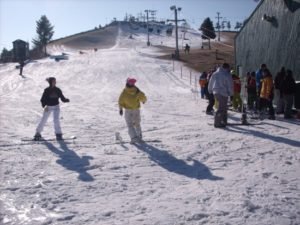 I remember when we were driving up to Milwaukee for some shopping and ahead of me I saw a sign that alerted us to an upcoming ski area. Cross country skiing is a big sport back there, but this sign had stick figure skiers pointed down in the middle of a couple of squiggly lines that were meant to signify a mountain.My jaw dropped.The highest thing I had seen in Wisconsin was an antenna on a fifth story apartment building. But the sign kept its promise and a mile later another sign with the same picture greeted us but this time with an arrow pointing to the left. I quickly went from a gaping open mouth to an exaggerated shaking of my head while zinging out in rapid fire succession, “No! No! No! No!”Right next to the sign that pointed us to the winter playground was another sign pointing the same direction that said, “County landfill.” These Wisconsinites had covered an old landfill with dirt, had installed a rope tow up to the top of the mound of trash and when the snow had covered enough of the pile with the fluffy white stuff they called it a ski area. Stunning!I grew up skiing at Arapahoe Basin in Colorado that takes one up above timberline to nearly 11,000 feet and in Vail with their overpriced lift tickets and celebrity residents. Those were ski areas! I suppose that this mound of dirt in Wisconsin was technically a ski area, but getting the words to fall out of my mouth was nothing less than painful.
I remember when we were driving up to Milwaukee for some shopping and ahead of me I saw a sign that alerted us to an upcoming ski area. Cross country skiing is a big sport back there, but this sign had stick figure skiers pointed down in the middle of a couple of squiggly lines that were meant to signify a mountain.My jaw dropped.The highest thing I had seen in Wisconsin was an antenna on a fifth story apartment building. But the sign kept its promise and a mile later another sign with the same picture greeted us but this time with an arrow pointing to the left. I quickly went from a gaping open mouth to an exaggerated shaking of my head while zinging out in rapid fire succession, “No! No! No! No!”Right next to the sign that pointed us to the winter playground was another sign pointing the same direction that said, “County landfill.” These Wisconsinites had covered an old landfill with dirt, had installed a rope tow up to the top of the mound of trash and when the snow had covered enough of the pile with the fluffy white stuff they called it a ski area. Stunning!I grew up skiing at Arapahoe Basin in Colorado that takes one up above timberline to nearly 11,000 feet and in Vail with their overpriced lift tickets and celebrity residents. Those were ski areas! I suppose that this mound of dirt in Wisconsin was technically a ski area, but getting the words to fall out of my mouth was nothing less than painful.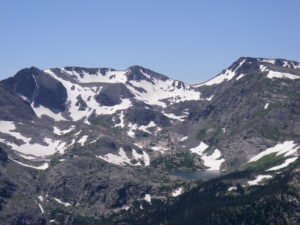 Like I said, I have always been a mountain person. But I don’t think I really knew that until one September day in 2011. I was seven weeks into my 4,000-mile cycling pilgrimage through the West. I had already crossed three major mountain ranges including the Cascades in Oregon and the Rockies twice, once in Montana and once in Colorado. I was nearing the foot of the Sierras after having spent more than one full week crossing the Nevada desert and nearly crushing me psychologically. I had rested for two days in Gardnerville, Nevada before tackling the final mountain range before cycling to the Pacific coast on my way back to Portland.The first few miles paralleled the base of the Sierras as I pedaled along farms with a few cattle, horses, sheep and goats. Eventually the road veered to the right and I was greeted with an increasingly steep road that was snaking its way through a pine-covered forest and alongside a rushing snow-fed stream.I had only pedaled a few strokes when I suddenly exhaled out loud, “I am home. I am home.” My body relaxed. My breathing settled in and I began cranking hard to power my way over the 8,573 foot Kit Carson pass that would point to the Central Valley of California. It was an odd moment. I was at the foot of a major mountain pass where I knew I was going to have to dig deep yet I relaxed as the road began to snake its way up into the stratosphere.
Like I said, I have always been a mountain person. But I don’t think I really knew that until one September day in 2011. I was seven weeks into my 4,000-mile cycling pilgrimage through the West. I had already crossed three major mountain ranges including the Cascades in Oregon and the Rockies twice, once in Montana and once in Colorado. I was nearing the foot of the Sierras after having spent more than one full week crossing the Nevada desert and nearly crushing me psychologically. I had rested for two days in Gardnerville, Nevada before tackling the final mountain range before cycling to the Pacific coast on my way back to Portland.The first few miles paralleled the base of the Sierras as I pedaled along farms with a few cattle, horses, sheep and goats. Eventually the road veered to the right and I was greeted with an increasingly steep road that was snaking its way through a pine-covered forest and alongside a rushing snow-fed stream.I had only pedaled a few strokes when I suddenly exhaled out loud, “I am home. I am home.” My body relaxed. My breathing settled in and I began cranking hard to power my way over the 8,573 foot Kit Carson pass that would point to the Central Valley of California. It was an odd moment. I was at the foot of a major mountain pass where I knew I was going to have to dig deep yet I relaxed as the road began to snake its way up into the stratosphere.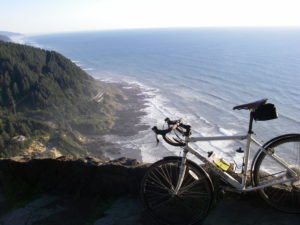 I know now that the mountains and my body and soul belong together. I really confirmed that during my two-year stint in the bucolic little village of Yachats on the Oregon coast. The truth is I had it really good there. Yachats sometimes shows up on the "Top Ten Best Places to Visit in the World" lists. It truly is a magical place. During my second year there I arranged to house sit for a family in exchange for watching over their property while it was for sale. This was a large modern house with picture windows that covered the entire span of the ocean-facing walls. The house was probably forty vertical feet above the ocean and every night I went to sleep with the sound of the waves rhythmically caressing me and the moist ocean air blowing through my window and across my face. And I was enjoying this rent free!Like I said, I had it really good! But given the option between an ocean front home and a cabin in the woods I would choose the latter every time. The ocean was magical. But I know I belong in the mountains.So to the mountains I go again!In September I will leave on another one of my magical adventures--this time to Nepal and Tibet where I and handful of other crazy cyclists will make an ascent in the Himalayas to a spot near Everest Base Camp. Four years ago I made a list of all the possible pilgrimages I might want to tackle. I ended up choosing the route to Rumi's Tomb in Konya, but the Everest Base Camp ascent was high on my list. I vowed it would be near the top next time the itch to travel overwhelmed me.
I know now that the mountains and my body and soul belong together. I really confirmed that during my two-year stint in the bucolic little village of Yachats on the Oregon coast. The truth is I had it really good there. Yachats sometimes shows up on the "Top Ten Best Places to Visit in the World" lists. It truly is a magical place. During my second year there I arranged to house sit for a family in exchange for watching over their property while it was for sale. This was a large modern house with picture windows that covered the entire span of the ocean-facing walls. The house was probably forty vertical feet above the ocean and every night I went to sleep with the sound of the waves rhythmically caressing me and the moist ocean air blowing through my window and across my face. And I was enjoying this rent free!Like I said, I had it really good! But given the option between an ocean front home and a cabin in the woods I would choose the latter every time. The ocean was magical. But I know I belong in the mountains.So to the mountains I go again!In September I will leave on another one of my magical adventures--this time to Nepal and Tibet where I and handful of other crazy cyclists will make an ascent in the Himalayas to a spot near Everest Base Camp. Four years ago I made a list of all the possible pilgrimages I might want to tackle. I ended up choosing the route to Rumi's Tomb in Konya, but the Everest Base Camp ascent was high on my list. I vowed it would be near the top next time the itch to travel overwhelmed me. But there is more to this.I have been a student of religious literature for nearly four decades now. One of the things that shows up consistently is that many of the epiphanies and revelations of religious literature happen on mountains. Moses is given the Ten Commandments on Mt. Sinai. Jesus is transfigured before the disciples' eyes on a mountain. Jesus even preaches a "sermon on the mount" as if his teachings were more likely to take root in the thin air of a mountain than in the bustling commotion of a marketplace.I know that my very first "mystical" experience--where I suddenly got lost in the scenery and couldn't find the line between the observer and the observed--happened on the top of a mountain after cranking my way up it on two wheels. Still to this day the mountains touch me in a place that no other landscape can. When I am in the mountains my lungs expand, my breathing deepens, and my soul exclaims, "You're home, Brian. You're home."As I have done in the past I will invite you into this journey. I am currently pouring over both sacred and secular literature where mountains play a significant and often transformative role. While in Nepal and Tibet I will be living with those texts in my mind and my heart while my legs carry me up the mountains. I will blog as often as Wifi is available in that remote place.Next blog will be a reflection on John Denver's song, Rocky Mountain High. "He was born in the summer of his 27th year..."See you at the top!
But there is more to this.I have been a student of religious literature for nearly four decades now. One of the things that shows up consistently is that many of the epiphanies and revelations of religious literature happen on mountains. Moses is given the Ten Commandments on Mt. Sinai. Jesus is transfigured before the disciples' eyes on a mountain. Jesus even preaches a "sermon on the mount" as if his teachings were more likely to take root in the thin air of a mountain than in the bustling commotion of a marketplace.I know that my very first "mystical" experience--where I suddenly got lost in the scenery and couldn't find the line between the observer and the observed--happened on the top of a mountain after cranking my way up it on two wheels. Still to this day the mountains touch me in a place that no other landscape can. When I am in the mountains my lungs expand, my breathing deepens, and my soul exclaims, "You're home, Brian. You're home."As I have done in the past I will invite you into this journey. I am currently pouring over both sacred and secular literature where mountains play a significant and often transformative role. While in Nepal and Tibet I will be living with those texts in my mind and my heart while my legs carry me up the mountains. I will blog as often as Wifi is available in that remote place.Next blog will be a reflection on John Denver's song, Rocky Mountain High. "He was born in the summer of his 27th year..."See you at the top!
Professional and Spiritual Vertigo--Part 2
 Are you ready for this? Just 36 hours before my scary vertigo incident two weeks ago this is what I wrote to my congregation in Grants Pass as I was sharing with them the "new normal" with regard to ministry. Here were my exact words:
Are you ready for this? Just 36 hours before my scary vertigo incident two weeks ago this is what I wrote to my congregation in Grants Pass as I was sharing with them the "new normal" with regard to ministry. Here were my exact words:
"It’s enough to make your head spin! Believe me, I know! I feel sometimes like the synapses are firing non-stop and the pistons of my thinker are threatening to go on strike. This is a dizzying time."
Wow! It was as if I was predicting my own vertigo attack without knowing it. I am still open to the possibility that it was, as the doctors diagnosed, a completely random event since they were not able to trace it to any particular physical condition such as sinus congestion, a head injury or repetitive motion. And many of you have, including blood relatives, offered great advice on what it might have been and what to do about it.But whether the diagnosis is correct or not I think this is a good opportunity to dive deeper into the "professional vertigo or spiritual vertigo" of which I spoke. It was interesting that in the responses from my readers to my last blog post I noticed a small pattern (not enough to make it verifiable!). I know some of my readers either personally or by association. And the little pattern that showed up was a recognition by those in the profession of ministry who said, "I know well the professional vertigo to which you speak." And then I also recognized another pattern by some who are involved in churches, but not as pastors, who said, "Don't give up, Brian. The church needs pastors like you."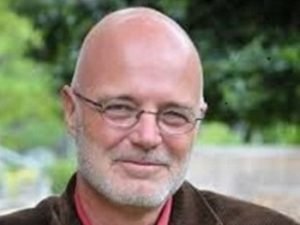 It is this dynamic to which I want to speak. The timing of this was especially interesting as just a couple of days after I published my blog piece Brian McLaren also published his blog piece on "Why Pastors and Priests are Leaving the Church--Part 2" In his piece he acknowledged that many pastors and priests feel as if their soul is dying. They entered ministry with a passion to carry out Christ's mission and ended up feeling like they have been asked to become building managers and protectors of the status quo (my slightly exaggerated paraphrase!).He went on to encourage pastors and priests to not retire early or choose another profession (as many are doing), but to commit to one of three other options that will help usher in the future of Christian community. Briefly he outlined the three as 1) start a new worshiping community, 2) becoming the catalyst for a crisis or intervention that would initiate #1, or 3) invest in the risky and hard work of transformation for those churches that still have the resources to do so.McLaren's blog post on "why pastors are leaving the church" and my vertigo attack could not be better timed. I want to say that I really appreciate McLaren's writing and his ministry. I believe that he is right on. But I also want to send a message to the folks sitting in the pews who quietly cheer people like me on in the hope that one day the church will look and feel a lot more like what they see in their heads and feel in their hearts.If my story is any indication of how costly this work is it isn't going to be enough for pastors and priests to step out on their own to facilitate the emergence of a new kind of church. Those pastors who commented on my last blog post knew well of the professional vertigo of which I speak. Many pastors today feel they have an either/or choice--livelihood or sacred calling. I think they will appreciate hearing this from me:
It is this dynamic to which I want to speak. The timing of this was especially interesting as just a couple of days after I published my blog piece Brian McLaren also published his blog piece on "Why Pastors and Priests are Leaving the Church--Part 2" In his piece he acknowledged that many pastors and priests feel as if their soul is dying. They entered ministry with a passion to carry out Christ's mission and ended up feeling like they have been asked to become building managers and protectors of the status quo (my slightly exaggerated paraphrase!).He went on to encourage pastors and priests to not retire early or choose another profession (as many are doing), but to commit to one of three other options that will help usher in the future of Christian community. Briefly he outlined the three as 1) start a new worshiping community, 2) becoming the catalyst for a crisis or intervention that would initiate #1, or 3) invest in the risky and hard work of transformation for those churches that still have the resources to do so.McLaren's blog post on "why pastors are leaving the church" and my vertigo attack could not be better timed. I want to say that I really appreciate McLaren's writing and his ministry. I believe that he is right on. But I also want to send a message to the folks sitting in the pews who quietly cheer people like me on in the hope that one day the church will look and feel a lot more like what they see in their heads and feel in their hearts.If my story is any indication of how costly this work is it isn't going to be enough for pastors and priests to step out on their own to facilitate the emergence of a new kind of church. Those pastors who commented on my last blog post knew well of the professional vertigo of which I speak. Many pastors today feel they have an either/or choice--livelihood or sacred calling. I think they will appreciate hearing this from me:
We pastors need to know that if we take the initial risks as McLaren and others encourage that there will be enough people in the pews to go with us so that we are not dangling out over a cliff for too long.
If there is a message in my sudden vertigo attack it is this: My body and soul may be crying for me to do more personal care-taking and less risk-taking. I have been at this for two full decades. The first time I initiated an emerging model in a church (option #1 in McLaren's scheme) I eventually was forced to resign when that emerging group grew too fast and too large and became a threat to the church. Later, in an artsy, philosophical coastal town I wrote a letter to the editor where I teasingly threw out that I thought of myself as an "agnostic Christian mystic biker-guy" in order to get the church and community talking about faith and spirituality. It worked. The community loved it. Church leaders contemplated firing me! More recently, I ended up on food stamps as I didn't time well the gap between two interim positions. This time I have purchased a camper just in case there is no work after my present call.All of this is to say, "I agree with Brian McLaren and some of my readers that the church needs pastors like me who are willing to take the risks to usher in this new church that is somewhere over the distant horizon yet close to our hearts." But you need to know that the costs are high. I have paid a price financially, emotionally, and professionally. Maybe the vertigo was completely coincidental. Or maybe it was my body and my soul's way of saying,
"You can't keep this up, Brian. You're almost 60, for Christ's sake!"
It is at least coincidental, if not ironic, that I wrote in my last newsletter article, "(Ministry today) is enough to make your head spin! It is dizzying!" 36 hours later I was laying on a bathroom floor unable to move in room that was spinning faster than a carnival ride.Even the three-month blog absence this spring was another sign of feeling caught between a livelihood and my calling to tease out a new future. In January I had started my job search as this present interim gradually moves toward its end. Memories of food stamps two years prior were still fresh in my mind as well as the unnerving ten months of unemployment. I wanted to blog, but I couldn't find my voice. I was afraid that too much vulnerability and honesty would keep me from getting interviews. And so I went into hiding.But somewhere between the unexpected loss of not getting the position in Colorado earlier this month and the vertigo attack just following were just the wake-up call I needed. My voice is starting to come back. These losses broke through my caution. But here is the deal. I am taking this vertigo message seriously. It is dizzying to both try to honor the needs of the present church and take the risks to tease out the future church. Every day is filled with wondering if I am playing it too safe in a church that continues to decline or taking too many risks in a church that is afraid of change. ("Play it safe and watch the church die or take risks and potentially lose my job. What a choice!") Every day I play a game where I make sure that I support the ministry status quo just enough to protect my livelihood, but not so much that I risk the rupture of my own soul and integrity.My readers are right. And Brian McLaren is right. The church and our communities desperately need pastors and priests like me who are willing to take the risks to invite the future church onto our doorstep. But I can't do it alone. I think my body and soul is telling me that now.I need and the church needs more than just quiet admiration from the sidelines. We need people who are willing to put their spiritual lives on the line for the future of the church. Until that happens pastors and priests will continue feel caught in the painful either/or of having a livelihood or following a more sacred calling.My mistake is that I have tried to have it both ways. Am I asking for too much?
But here is the deal. I am taking this vertigo message seriously. It is dizzying to both try to honor the needs of the present church and take the risks to tease out the future church. Every day is filled with wondering if I am playing it too safe in a church that continues to decline or taking too many risks in a church that is afraid of change. ("Play it safe and watch the church die or take risks and potentially lose my job. What a choice!") Every day I play a game where I make sure that I support the ministry status quo just enough to protect my livelihood, but not so much that I risk the rupture of my own soul and integrity.My readers are right. And Brian McLaren is right. The church and our communities desperately need pastors and priests like me who are willing to take the risks to invite the future church onto our doorstep. But I can't do it alone. I think my body and soul is telling me that now.I need and the church needs more than just quiet admiration from the sidelines. We need people who are willing to put their spiritual lives on the line for the future of the church. Until that happens pastors and priests will continue feel caught in the painful either/or of having a livelihood or following a more sacred calling.My mistake is that I have tried to have it both ways. Am I asking for too much?
Vertigo: Coincidence or Holy Kick in the Butt?
One of the things on which I have been able to pride myself over the years is my health. While I have sometimes struggled to keep consistent work, put roots down long enough to build relationships and establish a community the one thing I have always been able to say is, "At least I have my health." That is, until two weeks ago. I was suddenly awakened at 5:30 a.m. feeling like someone had just pushed the button to start a whirling, spinning carnival ride in my room. The room spun, sweat started oozing out of every pore of my body and a few minutes later I staggered to the bathroom to lose the contents of my evening's dinner. I expected that to be the end of violent episode imagining that I had a bad case of food poisoning. But it didn't end. After vomiting (sorry for all the yukky details) the nausea continued and I was too weak to even crawl back to my bed.I spent the next three hours trading places between the bathroom floor, my head hanging over the toilet bowl and a couple of desperate crawls back into bed. I was supposed to be leading a retreat for participants who had come as far as away as Australia and New York City to New Mexico as I helped them "Explore the Landscape of the Soul." Instead they found me in a near delirious state in my room--the vomiting and sweating taking me to the next dangerous level of dehydration (which is a serious issue at 6500 feet in the desert).I will save you all the details, but I spent the day in the Emergency Room an hour away, my two weeks of courses were promptly cancelled in order to get me home to heal. But then I suffered another attack three days later, the night before I was to fly back home. Another night in the ER and then five days of recovery at the home of new and very generous friends before having the strength to fly home again.
That is, until two weeks ago. I was suddenly awakened at 5:30 a.m. feeling like someone had just pushed the button to start a whirling, spinning carnival ride in my room. The room spun, sweat started oozing out of every pore of my body and a few minutes later I staggered to the bathroom to lose the contents of my evening's dinner. I expected that to be the end of violent episode imagining that I had a bad case of food poisoning. But it didn't end. After vomiting (sorry for all the yukky details) the nausea continued and I was too weak to even crawl back to my bed.I spent the next three hours trading places between the bathroom floor, my head hanging over the toilet bowl and a couple of desperate crawls back into bed. I was supposed to be leading a retreat for participants who had come as far as away as Australia and New York City to New Mexico as I helped them "Explore the Landscape of the Soul." Instead they found me in a near delirious state in my room--the vomiting and sweating taking me to the next dangerous level of dehydration (which is a serious issue at 6500 feet in the desert).I will save you all the details, but I spent the day in the Emergency Room an hour away, my two weeks of courses were promptly cancelled in order to get me home to heal. But then I suffered another attack three days later, the night before I was to fly back home. Another night in the ER and then five days of recovery at the home of new and very generous friends before having the strength to fly home again. I have titled this post "Vertigo: Coincidence or Holy Kick in the Butt." Both ER doctors diagnosed the same thing--I had an extreme case of vertigo. I used to think that vertigo just meant dizziness, but I have now learned that it is a whole lot more than that. It is a sudden violent attack on your equilibrium that can cause vomiting, sudden falls, and the inability to walk or even crawl. It is completely incapacitating. And the doctors have assured me that it is most likely a random attack.But I have subtitled this post "Coincidence or Holy Kick in the Butt" because I am not completely convinced that these episodes were completely random as the doctors had indicated. From a physical standpoint there was virtually nothing to point to. I had flown in from nearly sea level to 6500 feet, but just a week before I was in the Mile High City of Denver as well. I was reasonably well-hydrated as I had started drinking extra water even before my arrival. I wasn't suffering from congestion, a head injury or repetitive motions (all potential causes of vertigo). The doctors said that that is just how vertigo is--often completely random and coincidental.Yet I wonder.I wonder because I do believe the body has a way of sending messages when it needs to and "vertigo" would not be a far off description for what I had been feeling. I have written many times over the years of my feeling of "living between two worlds" which was actually the title of my 40-day Lenten devotional blog last year.
I have titled this post "Vertigo: Coincidence or Holy Kick in the Butt." Both ER doctors diagnosed the same thing--I had an extreme case of vertigo. I used to think that vertigo just meant dizziness, but I have now learned that it is a whole lot more than that. It is a sudden violent attack on your equilibrium that can cause vomiting, sudden falls, and the inability to walk or even crawl. It is completely incapacitating. And the doctors have assured me that it is most likely a random attack.But I have subtitled this post "Coincidence or Holy Kick in the Butt" because I am not completely convinced that these episodes were completely random as the doctors had indicated. From a physical standpoint there was virtually nothing to point to. I had flown in from nearly sea level to 6500 feet, but just a week before I was in the Mile High City of Denver as well. I was reasonably well-hydrated as I had started drinking extra water even before my arrival. I wasn't suffering from congestion, a head injury or repetitive motions (all potential causes of vertigo). The doctors said that that is just how vertigo is--often completely random and coincidental.Yet I wonder.I wonder because I do believe the body has a way of sending messages when it needs to and "vertigo" would not be a far off description for what I had been feeling. I have written many times over the years of my feeling of "living between two worlds" which was actually the title of my 40-day Lenten devotional blog last year.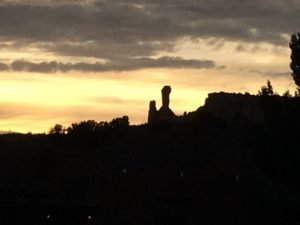 The past few weeks packed all those issues into a short time period. I spent May and the first week or so of June making sure the congregation I am serving in Grants Pass, Oregon was well-prepared for a three-week absence on my part. Then I flew off to Colorado for a 3-day job interview where my book Alone and my thoughts on the future of the church dominated much of the conversation. By the following Wednesday I heard that I was not the candidate chosen for the position. Without even a moment to let that loss sink in I then made my final preparations for the two one-week retreats in New Mexico titled, "Exploring the Landscape of the Soul" and "Health, Hope, and Hospice: Redefining Congregational Decline."The spiritual and professional vertigo is this and I have been trying to name it and negotiate my way through it for years. Within the space of just a few short weeks I played my role as a pastor of a pretty traditional Presbyterian church. A week later I was interviewing for another traditional position, but because of the public nature of my writing I found myself trying to soothe concerns that emerged in a book that exposed my spiritual wrestling (Some church members don't like their pastors wrestling too much!). Then I immediately prepared and flew off to lead "spiritual but not religious" people in the language of soul for one week to be followed by a week-long workshop for pastors serving seriously declining churches. Not only was it a crazy schedule, but it had me shifting constantly between worldviews, beliefs, and language.The spiritual and professional vertigo is this: I am constantly dancing between two different worlds depending on who I am talking to at any particular moment. Many people in the church are wary of the same spiritual wrestling that the "unchurched" find attractive in me. And those who find the sacred outside the walls of the church are often wary of my professional association with the church. In both places I have to overcome suspicions where one group is concerned that I am too religious and another group is concerned I am not religious enough.
The past few weeks packed all those issues into a short time period. I spent May and the first week or so of June making sure the congregation I am serving in Grants Pass, Oregon was well-prepared for a three-week absence on my part. Then I flew off to Colorado for a 3-day job interview where my book Alone and my thoughts on the future of the church dominated much of the conversation. By the following Wednesday I heard that I was not the candidate chosen for the position. Without even a moment to let that loss sink in I then made my final preparations for the two one-week retreats in New Mexico titled, "Exploring the Landscape of the Soul" and "Health, Hope, and Hospice: Redefining Congregational Decline."The spiritual and professional vertigo is this and I have been trying to name it and negotiate my way through it for years. Within the space of just a few short weeks I played my role as a pastor of a pretty traditional Presbyterian church. A week later I was interviewing for another traditional position, but because of the public nature of my writing I found myself trying to soothe concerns that emerged in a book that exposed my spiritual wrestling (Some church members don't like their pastors wrestling too much!). Then I immediately prepared and flew off to lead "spiritual but not religious" people in the language of soul for one week to be followed by a week-long workshop for pastors serving seriously declining churches. Not only was it a crazy schedule, but it had me shifting constantly between worldviews, beliefs, and language.The spiritual and professional vertigo is this: I am constantly dancing between two different worlds depending on who I am talking to at any particular moment. Many people in the church are wary of the same spiritual wrestling that the "unchurched" find attractive in me. And those who find the sacred outside the walls of the church are often wary of my professional association with the church. In both places I have to overcome suspicions where one group is concerned that I am too religious and another group is concerned I am not religious enough.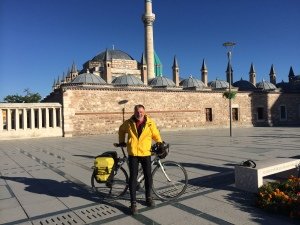 It is something that I have wrestled with for more than twenty years, but the last few weeks exaggerated the subtle spiritual schizophrenia as I flew from place to place and state to state shifting my language, my head, my heart and my soul in order to be present to those who find God on Sunday in a sanctuary and to those who experience the sacred in the magical landscape. It is a dizzying enterprise!The doctors told me that the vertigo was completely random. In fact they wouldn't be surprised if it never showed up again. But I wonder. I wonder if my body and soul was telling me something. I wonder if my spiritual vertigo exhibited physical symptoms this time. I wonder if there was a message in those episodes, "Brian, despite your best intentions and noble motives, you can't keep dancing between two different worlds. Eventually it will crack you. Eventually you'll start to spin out of control."Maybe the vertigo was, as the doctors told me, just a one-time random, terrifying and unsettling coincidence.Or maybe it was a holy kick in the butt with a deeper message.I don't know for sure, but I sure as hell better be listening.
It is something that I have wrestled with for more than twenty years, but the last few weeks exaggerated the subtle spiritual schizophrenia as I flew from place to place and state to state shifting my language, my head, my heart and my soul in order to be present to those who find God on Sunday in a sanctuary and to those who experience the sacred in the magical landscape. It is a dizzying enterprise!The doctors told me that the vertigo was completely random. In fact they wouldn't be surprised if it never showed up again. But I wonder. I wonder if my body and soul was telling me something. I wonder if my spiritual vertigo exhibited physical symptoms this time. I wonder if there was a message in those episodes, "Brian, despite your best intentions and noble motives, you can't keep dancing between two different worlds. Eventually it will crack you. Eventually you'll start to spin out of control."Maybe the vertigo was, as the doctors told me, just a one-time random, terrifying and unsettling coincidence.Or maybe it was a holy kick in the butt with a deeper message.I don't know for sure, but I sure as hell better be listening.
A Monk and a Mystic
I have a friend who, after listening to me, said, "I think you have a bit of a monk and a mystic in you." I have been thinking about that recently as I ponder another transition in my life. I am in the last few months of an interim pastorate in Grants Pass, Oregon. Given the length of time it takes to find pastoral work that is satisfying, fun and provides a modest livelihood, I have been engaged in the search process for a number of months now.I admit that as I face the uncertainty of the next step I have gotten rather used to a healthy paycheck. For the first time in my working life I have enjoyed the luxury of eating out when my schedule was too tight for cooking, putting a little money into a small IRA, and treating family and friends to meals just because it makes me feel good to be generous.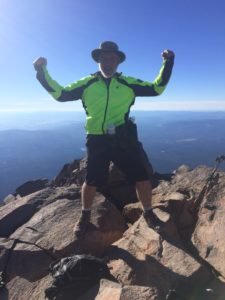 But the truth is my friend is right, "There is a bit of a monk and a mystic in me," and despite having enjoyed the luxury of a comfortable income these past two years I know that if it comes down to it I don't really need it.Four years ago I downsized dramatically, donated about 90% of my belongings to St. Vincents, and house sat for a year. The income I saved on rent paid for the cycling trip to Italy, Greece and Turkey in 2014. It took me a while to find employment again, but when I did I had replace a few items I had donated. While I had to purchase a few furnishings when I moved into my 2-bedroom apartment, I kept it at a minimum--a bed, a couple of bookcases, and cookware was all I needed. I remember a few years ago that I began thinking, "All I really need in my life is my guitar, my bike and a few really good friends." At the time I dismissed it as unrealistic and slightly delusional. "You can't just ride bikes and play guitar. You have to make a living!"But the older I get the more I am beginning to believe that my soul is trying to tell me something with this yearning for the simple.
But the truth is my friend is right, "There is a bit of a monk and a mystic in me," and despite having enjoyed the luxury of a comfortable income these past two years I know that if it comes down to it I don't really need it.Four years ago I downsized dramatically, donated about 90% of my belongings to St. Vincents, and house sat for a year. The income I saved on rent paid for the cycling trip to Italy, Greece and Turkey in 2014. It took me a while to find employment again, but when I did I had replace a few items I had donated. While I had to purchase a few furnishings when I moved into my 2-bedroom apartment, I kept it at a minimum--a bed, a couple of bookcases, and cookware was all I needed. I remember a few years ago that I began thinking, "All I really need in my life is my guitar, my bike and a few really good friends." At the time I dismissed it as unrealistic and slightly delusional. "You can't just ride bikes and play guitar. You have to make a living!"But the older I get the more I am beginning to believe that my soul is trying to tell me something with this yearning for the simple.
- How much of our working life is spent supporting a lifestyle that doesn't really feed us?
- How much time do we spend repairing, protecting and polishing up possessions that keep us chained to things that don't truly satisfy?
- How often do we complain that we can't just pick up and go because we have built a house and lifestyle that demands our daily attention?
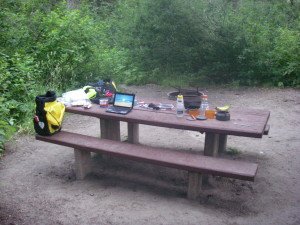 I remember a few years ago when I was the pastor at Eastminster in Portland. A man we fondly called John the Painter came to us during a particularly heavy rainstorm. He had been sleeping in the campground when the 3-day deluge had hit and wanted to know if he could sleep on our property in exchange for a little work. In the end he wound up staying a full six weeks in an extra room in the church while he repainted the entire inside of the church. It was a good deal for him and for us!But what I was struck by when he was there was that I had a certain attraction to him. John lived pretty free and somewhat easy life. He traveled around the country going where he wanted when he wanted. When he ran out of money he just stopped and offered his carpentry and painting skills until he had enough money to hit the road again. He had family in another state and every few months he returned to his grown children's homes and reacquainted himself with grandchildren. At first it seemed an irresponsible lifestyle, but I knew my soul recognized something in him that also lived in me.
I remember a few years ago when I was the pastor at Eastminster in Portland. A man we fondly called John the Painter came to us during a particularly heavy rainstorm. He had been sleeping in the campground when the 3-day deluge had hit and wanted to know if he could sleep on our property in exchange for a little work. In the end he wound up staying a full six weeks in an extra room in the church while he repainted the entire inside of the church. It was a good deal for him and for us!But what I was struck by when he was there was that I had a certain attraction to him. John lived pretty free and somewhat easy life. He traveled around the country going where he wanted when he wanted. When he ran out of money he just stopped and offered his carpentry and painting skills until he had enough money to hit the road again. He had family in another state and every few months he returned to his grown children's homes and reacquainted himself with grandchildren. At first it seemed an irresponsible lifestyle, but I knew my soul recognized something in him that also lived in me.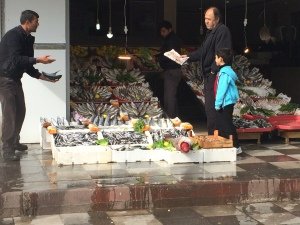 I doubt I would ever be as comfortable as John was living out of a tent, trusting that work would show up when he ran out of money, and having no backup plan for emergencies. But I recognized that there was a soulful way that he lived his life where most of his day could be dedicated to the things he enjoyed and that attracted him. He didn't have to wait for a weekend to explore a new place, or save up enough to go on vacation while holding down a mortgage. Exploring and discovering new things and meeting interesting people was a lifestyle for him. The simplicity of his life afforded a breadth and depth of experiences that most of us will never claim.I write this because I am reflecting on this coming period when I'll be facing another professional and financial transition again. I have to admit that I have enjoyed being able to go out and eat sushi, pay $30 for a concert ticket and put a little extra into that measly retirement account. If I had a choice I would live modestly (as I have here), but still enjoy a healthy income.But having a livelihood in the church is no guarantee these days. I can feel myself preparing for the possibility that there will either be no work or only part-time work. And I am struck by the fact that even if a comfortable livelihood is not waiting for me that I'll be okay. My friend is right. I do have a bit of the monk and the mystic in me.Like a monk I really only need a bed, a desk and a lamp.And like the mystic I could be pretty happy with just my guitar, my bike and a few good friends.Everything else is just a gift.
I doubt I would ever be as comfortable as John was living out of a tent, trusting that work would show up when he ran out of money, and having no backup plan for emergencies. But I recognized that there was a soulful way that he lived his life where most of his day could be dedicated to the things he enjoyed and that attracted him. He didn't have to wait for a weekend to explore a new place, or save up enough to go on vacation while holding down a mortgage. Exploring and discovering new things and meeting interesting people was a lifestyle for him. The simplicity of his life afforded a breadth and depth of experiences that most of us will never claim.I write this because I am reflecting on this coming period when I'll be facing another professional and financial transition again. I have to admit that I have enjoyed being able to go out and eat sushi, pay $30 for a concert ticket and put a little extra into that measly retirement account. If I had a choice I would live modestly (as I have here), but still enjoy a healthy income.But having a livelihood in the church is no guarantee these days. I can feel myself preparing for the possibility that there will either be no work or only part-time work. And I am struck by the fact that even if a comfortable livelihood is not waiting for me that I'll be okay. My friend is right. I do have a bit of the monk and the mystic in me.Like a monk I really only need a bed, a desk and a lamp.And like the mystic I could be pretty happy with just my guitar, my bike and a few good friends.Everything else is just a gift.
When the Terrain Changes...
Mystic Mondays February 13, 2017Dear Friends,The time has come. After ten months of writing under the Mystic Monday title I am once again needing the freedom to let my voice emerge more naturally again. I do so with some hesitation. Many of you have informed me that it's the first thing you look for on Monday mornings. There is nothing as satisfying for a writer than knowing that people are anticipating the next thing you might write. I suppose that is part of the reason for freeing myself up.I had anticipated that I would do more introduce you to the world of religious mysticism and the ways that many of us are already practicing it without the benefit or the burden of the name. But honestly, the whole Trump blitzkrieg flooded my soul and consciousness many weeks. I had to write my way through that or risk letting having the psychic toxins poison my whole being. My voice is feeling muddied and it's time to clean it up again. But there is more to it than that. The Rome to Rumi book is begging to be written. I am also preparing for what has become my every two to three year job search as I near the end of my current interim. With that I am finding myself once again pondering just where I belong. I am receiving calls to work with churches that are in need of transformational leadership. At the same time that I am receiving more invitations to lead workshops, write blog posts for other media, do soul coaching, and lead pilgrimages. Right now it's hard to know which path to take.One year ago I wrote under the blog title "Between Two Worlds" in a daily Lenten devotional where I shared my struggle with feeling caught between a religious institution that seems to be eroding away and an emerging spiritual consciousness that is forming but has little structure. But if I felt stuck between the two in the past with no sense of belonging in either, now I feel pulled from both directions. It seems that I have established my credibility to speak to both and now my challenge is whether to lean more toward one world than the other. There is more financial and professional stability in serving the church, but less of a long term future. And being part of the emerging world of spiritual community is titillating, but at least for now it doesn't put the beans and rice on the table.But despite letting the Mystic Monday post go I can promise you that I will continue to blog and write on a fairly regular basis. What has changed is that I now need to remove the stricture of the Mystic Monday theme and let my posts and themes come to me again more naturally. In recent weeks to column has felt more forced.There would have been a time when I would have seen this as a failure of sorts. But not today. I think my two pilgrimages taught me this. The soul doesn't operate on a predictable and exact schedule. Like growth spurts, the soul seems to have long fallow periods and then a sudden surge of creative juices that may last for weeks or months.I remember when this happened on my Rome to Rumi pilgrimage. I had made a general plan to ride from Rome, Italy to Konya, Turkey, passing through the northern part of Greece. I began the trip naively thinking that I was doing it more for the community than I was for myself. That became apparent just a week or so into the journey as I struggled with internet issues and briefly toyed with the idea that the trek was not even worth it if I couldn't blog about it on a daily basis. Silly me!
But there is more to it than that. The Rome to Rumi book is begging to be written. I am also preparing for what has become my every two to three year job search as I near the end of my current interim. With that I am finding myself once again pondering just where I belong. I am receiving calls to work with churches that are in need of transformational leadership. At the same time that I am receiving more invitations to lead workshops, write blog posts for other media, do soul coaching, and lead pilgrimages. Right now it's hard to know which path to take.One year ago I wrote under the blog title "Between Two Worlds" in a daily Lenten devotional where I shared my struggle with feeling caught between a religious institution that seems to be eroding away and an emerging spiritual consciousness that is forming but has little structure. But if I felt stuck between the two in the past with no sense of belonging in either, now I feel pulled from both directions. It seems that I have established my credibility to speak to both and now my challenge is whether to lean more toward one world than the other. There is more financial and professional stability in serving the church, but less of a long term future. And being part of the emerging world of spiritual community is titillating, but at least for now it doesn't put the beans and rice on the table.But despite letting the Mystic Monday post go I can promise you that I will continue to blog and write on a fairly regular basis. What has changed is that I now need to remove the stricture of the Mystic Monday theme and let my posts and themes come to me again more naturally. In recent weeks to column has felt more forced.There would have been a time when I would have seen this as a failure of sorts. But not today. I think my two pilgrimages taught me this. The soul doesn't operate on a predictable and exact schedule. Like growth spurts, the soul seems to have long fallow periods and then a sudden surge of creative juices that may last for weeks or months.I remember when this happened on my Rome to Rumi pilgrimage. I had made a general plan to ride from Rome, Italy to Konya, Turkey, passing through the northern part of Greece. I began the trip naively thinking that I was doing it more for the community than I was for myself. That became apparent just a week or so into the journey as I struggled with internet issues and briefly toyed with the idea that the trek was not even worth it if I couldn't blog about it on a daily basis. Silly me!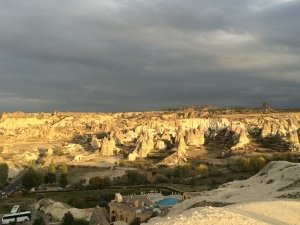 I soon righted my thinking and spent the next four weeks in physically and spiritually challenging terrain. And then, as pilgrimages do, things shifted again. Just before arriving in Istanbul I realized that my deepest pilgrimage work was done, but I was still a full 400 miles from my destination in Konya. The terrain south of Istanbul was both unfamiliar and felt like just an obstacle between where I was and where I wanted to go. I switched up my plans, took a bus to the biking paradise of Cappadokia, famous for their hot air balloon rides, chimney rocks, and ancient Christian cliff dwellings and then rode the last 200 miles into Konya as planned. My soul knew what what it wanted even if it didn't fit my original plans.I say this because I have this sense that I am on some sort of a life-long spiritual pilgrimage with regards to the future of the church, spiritual community and religious mysticism. For a few miles (and a few weeks) it felt exactly right to write under the title of "Between Two Worlds" last Lent. Then for a few more miles (months actually) the Mystic Monday title worked, although awkwardly as political forces muddied the waters more than once. Now I am in new terrain once again. The landscape has changed. New opportunities are opening up ahead of me. Financial considerations will once again dictate much of what I can do and can't do. And that Rome to Rumi book is pestering me more and more and getting tired of being put off.I assure you, I am not going away. Mystic Mondays is just taking a break. But this pilgrimage of discovery continues. Our work is not done yet.
I soon righted my thinking and spent the next four weeks in physically and spiritually challenging terrain. And then, as pilgrimages do, things shifted again. Just before arriving in Istanbul I realized that my deepest pilgrimage work was done, but I was still a full 400 miles from my destination in Konya. The terrain south of Istanbul was both unfamiliar and felt like just an obstacle between where I was and where I wanted to go. I switched up my plans, took a bus to the biking paradise of Cappadokia, famous for their hot air balloon rides, chimney rocks, and ancient Christian cliff dwellings and then rode the last 200 miles into Konya as planned. My soul knew what what it wanted even if it didn't fit my original plans.I say this because I have this sense that I am on some sort of a life-long spiritual pilgrimage with regards to the future of the church, spiritual community and religious mysticism. For a few miles (and a few weeks) it felt exactly right to write under the title of "Between Two Worlds" last Lent. Then for a few more miles (months actually) the Mystic Monday title worked, although awkwardly as political forces muddied the waters more than once. Now I am in new terrain once again. The landscape has changed. New opportunities are opening up ahead of me. Financial considerations will once again dictate much of what I can do and can't do. And that Rome to Rumi book is pestering me more and more and getting tired of being put off.I assure you, I am not going away. Mystic Mondays is just taking a break. But this pilgrimage of discovery continues. Our work is not done yet.
Pray continuously--really?
Mystic Mondays February 6, 2017"Rejoice always, pray without ceasing, give thanks in all circumstances..." 1 Thessalonians 5: 16-18I don't quote a lot of scripture in my blog, partly because the world of spiritual truth has come to me from so many places in recent years--chance encounters, something I overheard at the checkout stand, and other wisdom literature besides the Bible. I also don't quote scripture a great deal because my readers are an eclectic bunch of folks--some who keep the pews warm on a regular basis as well as those whose “church” is on the beach, in the mountains, or sitting with a friend over a good glass of Merlot.But there is one line in this passage that tells a story of my own spiritual development--"Pray without ceasing." Quite honestly the "rejoice always" and "give thanks in all circumstances" is still baffling to me. I am too much of a believer in calling sadness sadness. And some things are just too damn painful and ugly to be thankful for. But this whole "pray without ceasing" thing is starting to make sense to me. Years ago (okay, decades) the only context I had for understanding this line came from my rather narrow view of prayer. I thought I knew what prayer was. Prayer was that time when you sat with your head bowed while the pastor droned on with a whole laundry list of requests. Prayer was the "God is great. God is good. Let us thank Him for our food," that we rushed through before dinner at youth group meetings. Prayer was anything that was said after the words, "Dear God..."Funny thing has been happening in recent years. With the exception of my professional role as a pastor those types of prayers are decreasing in use and a different kind of prayer is increasing. While the admonition to "pray without ceasing" felt at one time to be a kind of impossible goal that only cloistered monks could even attempt, today I see it as a possibility. A far off possibility, but a possibility nonetheless.Prayer for me has become less an act of talking to God (or whatever Spirit floats around this Universe) and more of a constant attempt to align myself with the Soul of Life. This is all going to sound rather New Agey and ethereal, but I know of no other way to describe this shift I can feel in my body and soul. Prayer is becoming more about my attempts to enter into the reality of Life, a reality that often lies under the surface of the actual words and messages we send. Prayer is a disposition I hold toward the hours of day rather than an activity I have to add to my day.
But this whole "pray without ceasing" thing is starting to make sense to me. Years ago (okay, decades) the only context I had for understanding this line came from my rather narrow view of prayer. I thought I knew what prayer was. Prayer was that time when you sat with your head bowed while the pastor droned on with a whole laundry list of requests. Prayer was the "God is great. God is good. Let us thank Him for our food," that we rushed through before dinner at youth group meetings. Prayer was anything that was said after the words, "Dear God..."Funny thing has been happening in recent years. With the exception of my professional role as a pastor those types of prayers are decreasing in use and a different kind of prayer is increasing. While the admonition to "pray without ceasing" felt at one time to be a kind of impossible goal that only cloistered monks could even attempt, today I see it as a possibility. A far off possibility, but a possibility nonetheless.Prayer for me has become less an act of talking to God (or whatever Spirit floats around this Universe) and more of a constant attempt to align myself with the Soul of Life. This is all going to sound rather New Agey and ethereal, but I know of no other way to describe this shift I can feel in my body and soul. Prayer is becoming more about my attempts to enter into the reality of Life, a reality that often lies under the surface of the actual words and messages we send. Prayer is a disposition I hold toward the hours of day rather than an activity I have to add to my day. Somehow the words prayer and presence seem deeply wedded to each other. The more I approach a situation or a person with a prayerful attitude the more I feel present. The vice versa is also true. The more I try to be deeply, emotionally, and soulfully present to another person the more the encounter feels like a form of shared prayer.I am coming to experience that prayer is not an act of trying to talk to God as if God was on the other end of a phone call. Prayer is not a request I shoot up to the heavens. Prayer is beginning to feel like lying in my lover's arms-where no words need be spoken, knowing glances are shared in a delicious intimacy, and hearts beat as one.And what's amazing--and why I am beginning to believe that this whole pray without ceasing thing is possible--is that that intimate feeling with Life is possible anywhere anytime. It doesn't have to just be before a meal, in a church, or at the foot of one's bed. It doesn't have to begin with any particular prescribed words. Often it is as simple as taking a few really deep cleansing breaths, shedding the layers of crud from our mind and heart, and entering the deeper reality that is before us.I used to believe that one could not pray without ceasing because there were other things to attend to as well. How would I ever shop and spend time with friends and exercise if all I did was pray? How would pay bills, make a living and take care of my house if I spent all day in prayer.But now I don’t see it that way. Prayer doesn’t compete with the activities of life. It deepens them. Prayer is not an extra activity to add to life. Prayer is the sacred window through which we look at life.Pray without ceasing. And if that is too much for you, then just take a really deep, cleansing breath, and then another, and another, one after another, all day long. Breathe until your breaths turn into prayers. Then don’t stop.
Somehow the words prayer and presence seem deeply wedded to each other. The more I approach a situation or a person with a prayerful attitude the more I feel present. The vice versa is also true. The more I try to be deeply, emotionally, and soulfully present to another person the more the encounter feels like a form of shared prayer.I am coming to experience that prayer is not an act of trying to talk to God as if God was on the other end of a phone call. Prayer is not a request I shoot up to the heavens. Prayer is beginning to feel like lying in my lover's arms-where no words need be spoken, knowing glances are shared in a delicious intimacy, and hearts beat as one.And what's amazing--and why I am beginning to believe that this whole pray without ceasing thing is possible--is that that intimate feeling with Life is possible anywhere anytime. It doesn't have to just be before a meal, in a church, or at the foot of one's bed. It doesn't have to begin with any particular prescribed words. Often it is as simple as taking a few really deep cleansing breaths, shedding the layers of crud from our mind and heart, and entering the deeper reality that is before us.I used to believe that one could not pray without ceasing because there were other things to attend to as well. How would I ever shop and spend time with friends and exercise if all I did was pray? How would pay bills, make a living and take care of my house if I spent all day in prayer.But now I don’t see it that way. Prayer doesn’t compete with the activities of life. It deepens them. Prayer is not an extra activity to add to life. Prayer is the sacred window through which we look at life.Pray without ceasing. And if that is too much for you, then just take a really deep, cleansing breath, and then another, and another, one after another, all day long. Breathe until your breaths turn into prayers. Then don’t stop.
Drum, Dance and Sing!
Mystic Mondays January 30, 2017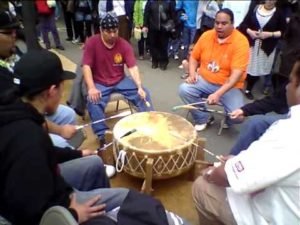 "Drums, Dancing and Singing."Those were the words that a friend shared me with as we talked about how to survive this time. Both of us were feeling that the very foundation of what we thought was American was falling away like chunks of an iceberg during a spring thaw. I was sharing how the impact of the swift and brutal changes was leaving me alternating between a deep rage and numbness. At this she said, "You know the Native Americans, who have lived with centuries' worth of national trauma, have a saying: 'Every day drum, dance and sing--every day!'"It didn't take a doctor or advice from a friend to get me there. Already in recent weeks I had made it a goal to exercise daily, practice some therapeutic yoga, and pluck away on the guitar. Of course, the day often gets away from me, but more days than not I get to the gym to join others in a spinning class or take a walk through the cow and horse pastures near my home and get a few minutes of guitar practice. I never miss my yoga!
"Drums, Dancing and Singing."Those were the words that a friend shared me with as we talked about how to survive this time. Both of us were feeling that the very foundation of what we thought was American was falling away like chunks of an iceberg during a spring thaw. I was sharing how the impact of the swift and brutal changes was leaving me alternating between a deep rage and numbness. At this she said, "You know the Native Americans, who have lived with centuries' worth of national trauma, have a saying: 'Every day drum, dance and sing--every day!'"It didn't take a doctor or advice from a friend to get me there. Already in recent weeks I had made it a goal to exercise daily, practice some therapeutic yoga, and pluck away on the guitar. Of course, the day often gets away from me, but more days than not I get to the gym to join others in a spinning class or take a walk through the cow and horse pastures near my home and get a few minutes of guitar practice. I never miss my yoga! I always knew that these things were good for me. Doctors remind us to take care of ourselves--eat well and exercise regularly. Pastors remind their flocks that Christian living isn't all serving, but also enjoying God's creation. Exercise gurus remind us that we will live longer if our bodies are healthier.But never have I felt the need to commit to these daily disciplines like I do now. This has to do with keeping my sanity. I wished I could say that I am offering that slightly tongue in cheek, but I am not. I am quite sure that I mean that in a clinical sense! I have to slip a handful of daily joys into my life or this madness will sweep me away.I am baffled beyond comprehension by what is happening to our country: Precious presidential hours spent on crowd sizes, alternative facts (can those two words go together, really?), travel bans that serve to help in terrorist recruitment rather than to curb it, and confused, nonsensical jibberish-talk from the president. I have a spend my whole working life dealing with difficult people and situations and I have to admit, I presently don't have the tools to deal with this.
I always knew that these things were good for me. Doctors remind us to take care of ourselves--eat well and exercise regularly. Pastors remind their flocks that Christian living isn't all serving, but also enjoying God's creation. Exercise gurus remind us that we will live longer if our bodies are healthier.But never have I felt the need to commit to these daily disciplines like I do now. This has to do with keeping my sanity. I wished I could say that I am offering that slightly tongue in cheek, but I am not. I am quite sure that I mean that in a clinical sense! I have to slip a handful of daily joys into my life or this madness will sweep me away.I am baffled beyond comprehension by what is happening to our country: Precious presidential hours spent on crowd sizes, alternative facts (can those two words go together, really?), travel bans that serve to help in terrorist recruitment rather than to curb it, and confused, nonsensical jibberish-talk from the president. I have a spend my whole working life dealing with difficult people and situations and I have to admit, I presently don't have the tools to deal with this. I have a friend who is one of the brightest people I know who recently admitted, "There is a darkness emerging from me that I never knew was there. I have never felt such rage nor ever experienced such dark thoughts. How are people coping?" I told her she wasn't alone and then shared that I have had to resort to a daily dose of goodness--cycling, walking, yoga, beer, chocolate, singing and guitar. Another friend who has been at the forefront of social justice work said he too was resorting to simple pleasures--time with family, fly fishing, a good bottle of wine, a day in the forest.Of course we are saying the same thing that the Native American motto has long advised--"Drum, dance and sing--every day!" I used to think of those things as adding richness to my life. Now I think of them as survival tools. Now I think of them as holding on to what is good in a world that is rapidly slipping away.But these reminders tell me something. They tell me that I am in for the long haul on this. This is not a retreat. This sudden commitment to carve out a portion of each day for joy and pleasure and goodness comes from the realization that recovering a compassionate politics and a just society isn't going to happen with a single million-person march, or a seven-week series of inspiring sermons or a signed petition to our senator.This battle will take years, maybe my whole working life, and possibly to my dying day. This isn't going to be one of those endeavors that we put heart and soul and body and mind into and then rest and relax and enjoy when we are finally done. This is not one of those times we can sprint to finish line with one dedicated burst of energy. This will be a marathon. We will have to pace ourselves. We will have to even smell the roses along the way.Drum, dance and sing now. Why? Because that's how we'll survive. Why? Because those are the things worth fighting for.
I have a friend who is one of the brightest people I know who recently admitted, "There is a darkness emerging from me that I never knew was there. I have never felt such rage nor ever experienced such dark thoughts. How are people coping?" I told her she wasn't alone and then shared that I have had to resort to a daily dose of goodness--cycling, walking, yoga, beer, chocolate, singing and guitar. Another friend who has been at the forefront of social justice work said he too was resorting to simple pleasures--time with family, fly fishing, a good bottle of wine, a day in the forest.Of course we are saying the same thing that the Native American motto has long advised--"Drum, dance and sing--every day!" I used to think of those things as adding richness to my life. Now I think of them as survival tools. Now I think of them as holding on to what is good in a world that is rapidly slipping away.But these reminders tell me something. They tell me that I am in for the long haul on this. This is not a retreat. This sudden commitment to carve out a portion of each day for joy and pleasure and goodness comes from the realization that recovering a compassionate politics and a just society isn't going to happen with a single million-person march, or a seven-week series of inspiring sermons or a signed petition to our senator.This battle will take years, maybe my whole working life, and possibly to my dying day. This isn't going to be one of those endeavors that we put heart and soul and body and mind into and then rest and relax and enjoy when we are finally done. This is not one of those times we can sprint to finish line with one dedicated burst of energy. This will be a marathon. We will have to pace ourselves. We will have to even smell the roses along the way.Drum, dance and sing now. Why? Because that's how we'll survive. Why? Because those are the things worth fighting for.
Wonder and Wondering...
Mystic Mondays January 23, 2017
"Without wonder there is little depth of presence."
This is the line I read a few days ago from John O'Donohue's book Eternal Echoes, the book I am currently using for my morning meditation time. I immediately stopped reading. The line spoke a truth I had not pondered before. But I knew immediately that it spoke a truth that I was ready to hear. It has been swirling around in my head and heart for nearly a full week now. But I have a confession to make. I made five full attempts to write about this quote--each time with little success. I couldn't figure out what the block was. I would write, delete, write again, delete, etc. Finally it hit me. I was trying to put to words and define and unravel this quote as if my words would bring it to life. I was taking the topic of wonder and writing the wonder right out of it. It was as if I had dissected and parsed the word mystery until I had wrung out and squeezed all the mystery right out of it.So today I am just going to leave you with the same questions that I have been pondering all week, but haven't given any succinct answers. This has been a week-long meditation that instead of resolving itself neatly has rather become broader and fallen deeper into my soul each day.Here are my questions:
But I have a confession to make. I made five full attempts to write about this quote--each time with little success. I couldn't figure out what the block was. I would write, delete, write again, delete, etc. Finally it hit me. I was trying to put to words and define and unravel this quote as if my words would bring it to life. I was taking the topic of wonder and writing the wonder right out of it. It was as if I had dissected and parsed the word mystery until I had wrung out and squeezed all the mystery right out of it.So today I am just going to leave you with the same questions that I have been pondering all week, but haven't given any succinct answers. This has been a week-long meditation that instead of resolving itself neatly has rather become broader and fallen deeper into my soul each day.Here are my questions:
- When you are with friends and family do you look at them through the eyes of wonder?
- Is the world already solved for you or is there room for a lifetime of curiosity and discovery?
- Do you see people as predictable personality types or as abstract works of art that have many possible meanings?
- Are you comfortable living life with ambiguity and uncertainty?
- Do you feel the need to solve life's challenges or is it possible to embrace challenges as friends?
- Are you comfortable living into the Mystery of it all without any assurances?
Maybe next week I'll have more to say (or maybe not).Until then I am still pondering and wondering...
January 21-March or Mountains?
Mystic Mondays January 16, 2017Tough decision--March or Mountains?On Saturday, January 21 (yes, that January 21 hours after the inauguration) I am sponsoring a ranger-guided snowshoe trip up at Crater Lake (if they re-open after getting too much snow!) Like me, this handful of Earth Adventurers went back and forth. "Do I go up and enjoy a magical day in the snow or do I join the Women's March in Ashland,” they asked themselves.Strangely, torn as I was, I was not as torn about the conflict as I might have been in the past. I might have foregone a trip up into the snow or a day at the beach or a hike in the woods if some urgent activist opportunity had presented itself. I have participated in a handful of protests and marches over the years. I am not one to show up at every protest as if it is a weekend hobby, but I have felt a deep moral obligation to participate in some where my conscience demanded it. But as strongly as I feel this time I didn't find myself automatically carving out the day to join my sisters in Ashland.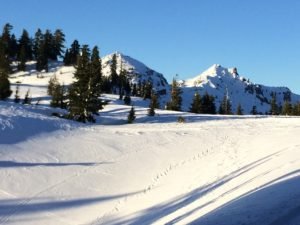 So what was different this time. The truth is I would love to join those who are marching for "humanitarian rights, the environment and marginalized people everywhere" as the Ashland Daily Tidings article describes. But just as badly I need to immerse myself in beauty and goodness. I need to tromp through two feet of new fluffy powder and feel the cold frigid air shock my lungs. I need to take in the Christmas card snapshot of tree bows loaded down with bean bag-size clumps of snow. I need to stop and gaze at the glistening reflection of a high mountain sun bouncing off the blinding snow.As the weeks have passed since the T-man's election I have found myself vacillating between the engaged determination of an activist and the Om-humming contemplation of a Buddhist monk. Strangely enough both feel like faithful responses to the terrifying developments that have fallen on our country like an unexpected outer space asteroid. In the past a retreat to the mountains would have felt like a copout to me. "Who has the luxury of soul prayer in a dangerous time like this," I might have scolded myself. "This isn't the time for sitting on my butt. This is a time for action!"But not this time. I need both. Something in me demands both. This is soul survival.If I only withdraw from the ugliness of this time I would forever beat myself up for whatever sins I commit by the act of omission. On the other hand, I know that if lose touch with beauty and goodness and mystery and magic I will die. And I am pretty sure that I don't just mean that metaphorically. One must have hope to survive. One must have an innate belief that the "great moral arc of history" really does bend toward justice, peace and goodness. Without hope our spirit dies and, sometimes, our bodies follow. This snowshoe trip doesn’t feel like an option. I have to dig deep and hold onto LIFE.In a few days some of the nation will be gathered in large groups in Washington D.C., New York City, Portland, and even little Ashland just south of my home. They will march and protest on behalf of all marginalized people everywhere. If the big "T" puts actions to his words a whole helluva a lot activism is going to be needed. And I will be there.
So what was different this time. The truth is I would love to join those who are marching for "humanitarian rights, the environment and marginalized people everywhere" as the Ashland Daily Tidings article describes. But just as badly I need to immerse myself in beauty and goodness. I need to tromp through two feet of new fluffy powder and feel the cold frigid air shock my lungs. I need to take in the Christmas card snapshot of tree bows loaded down with bean bag-size clumps of snow. I need to stop and gaze at the glistening reflection of a high mountain sun bouncing off the blinding snow.As the weeks have passed since the T-man's election I have found myself vacillating between the engaged determination of an activist and the Om-humming contemplation of a Buddhist monk. Strangely enough both feel like faithful responses to the terrifying developments that have fallen on our country like an unexpected outer space asteroid. In the past a retreat to the mountains would have felt like a copout to me. "Who has the luxury of soul prayer in a dangerous time like this," I might have scolded myself. "This isn't the time for sitting on my butt. This is a time for action!"But not this time. I need both. Something in me demands both. This is soul survival.If I only withdraw from the ugliness of this time I would forever beat myself up for whatever sins I commit by the act of omission. On the other hand, I know that if lose touch with beauty and goodness and mystery and magic I will die. And I am pretty sure that I don't just mean that metaphorically. One must have hope to survive. One must have an innate belief that the "great moral arc of history" really does bend toward justice, peace and goodness. Without hope our spirit dies and, sometimes, our bodies follow. This snowshoe trip doesn’t feel like an option. I have to dig deep and hold onto LIFE.In a few days some of the nation will be gathered in large groups in Washington D.C., New York City, Portland, and even little Ashland just south of my home. They will march and protest on behalf of all marginalized people everywhere. If the big "T" puts actions to his words a whole helluva a lot activism is going to be needed. And I will be there. But I believe that twenty five of us on Saturday will protest in our way. It is a protest against the insanity, the ugliness, and the terror of this time. Rather than fight against the darkness this day (there will be more to come I fear) we will enjoy the light. We will drive skyward up to Crater Lake and snowshoe on the eight feet of new snow received this past week. We will breathe the pure frigid mountain air deep into our lungs as a way of purifying. We will laugh and sing and take pictures together. Some of us might throw snowballs, lie in the fluffy stuff and make angels, and, if brave enough, wrestle each other to the ground like we did as children. We will remember when the world was still full of delight, hope and magic.It won’t be enough to just to fight against the darkness this time. We also will have to hold onto the light, lest we forget. We can’t forget. We have to fight, but we also have to remember. We have to march, but we can't forget to snowshoe, drink good wine, play like children, and make love. Fight the ugliness, but also hold onto the beauty.
But I believe that twenty five of us on Saturday will protest in our way. It is a protest against the insanity, the ugliness, and the terror of this time. Rather than fight against the darkness this day (there will be more to come I fear) we will enjoy the light. We will drive skyward up to Crater Lake and snowshoe on the eight feet of new snow received this past week. We will breathe the pure frigid mountain air deep into our lungs as a way of purifying. We will laugh and sing and take pictures together. Some of us might throw snowballs, lie in the fluffy stuff and make angels, and, if brave enough, wrestle each other to the ground like we did as children. We will remember when the world was still full of delight, hope and magic.It won’t be enough to just to fight against the darkness this time. We also will have to hold onto the light, lest we forget. We can’t forget. We have to fight, but we also have to remember. We have to march, but we can't forget to snowshoe, drink good wine, play like children, and make love. Fight the ugliness, but also hold onto the beauty.
How the Pulpit Became Political
Mystic Mondays January 9, 2017"Remember, you yourselves were once strangers in the land of Egypt." Ex. 22: 21Today I preached a sermon at the church where I am currently serving as an interim pastor. I was preaching on the first part of their new mission statement, "Welcoming all, as God's people, on our journeys of faith." Speaking to the first phrase, "welcoming all" I reminded my congregation that it is an essential part of the Judeo-Christian narrative to be welcoming to the stranger, the different, the alien and the outcast among us.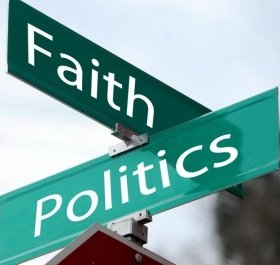 In any other context and time I think my sermon would have been heard as a good reminder to what makes us church. It would have been heard as a purely spiritual message of how we learn to live more deeply into our Christian character. It would have been pulpit preaching at its most normative.But a strange thing has been happening in my sermons. Despite no manipulative maneuvering on my part most of my sermons feel like they have a political angle to them. The pulpit is feeling political no matter what I say.I have for years offered the same benediction at the end of the service. It used to be a feel good benediction and charge to the congregation to go out and live the words that we had prayed, sung and heard in the service. But now not so much. They sound political. They sound like a charge to go into battle.I never intended it this way, but I can hear the words in my own head. With my arms raised in the typical blessing style I say, "Strengthen the fainthearted, support the weak, and help the suffering," and I can't help but feel like I am making a political statement. I can't help but to think I am drawing a line in the sand and saying, "Mr. Trump you can't steal this from us. We are going to fight you on this one."
In any other context and time I think my sermon would have been heard as a good reminder to what makes us church. It would have been heard as a purely spiritual message of how we learn to live more deeply into our Christian character. It would have been pulpit preaching at its most normative.But a strange thing has been happening in my sermons. Despite no manipulative maneuvering on my part most of my sermons feel like they have a political angle to them. The pulpit is feeling political no matter what I say.I have for years offered the same benediction at the end of the service. It used to be a feel good benediction and charge to the congregation to go out and live the words that we had prayed, sung and heard in the service. But now not so much. They sound political. They sound like a charge to go into battle.I never intended it this way, but I can hear the words in my own head. With my arms raised in the typical blessing style I say, "Strengthen the fainthearted, support the weak, and help the suffering," and I can't help but feel like I am making a political statement. I can't help but to think I am drawing a line in the sand and saying, "Mr. Trump you can't steal this from us. We are going to fight you on this one." And the funny thing is this happened with no change on my part. My preaching hasn't changed at all. I am preaching the same messages I have preached for a twenty years. But now they sound different. The context has changed. Our ears hear a different message. New images pop up in our heads that weren't there before.When we sing, "Jesus loves the little children, all the children of the world, red and yellow, black and white..." it doesn't sound so innocent anymore. It sounds like we are taking a stand. It sounds like we are facing off with a political figure and movement. It sounds like we are marching into war.But WE haven't changed the words. Mr. Trump changed the context (or at least exposed a hidden, festering underground people).I say, "Jesus calls us to honor the dignity of every person" and it sounds like I am calling Trump out for mocking a disabled reporter.I say, "Remember, we were once strangers in the land of Egypt" and it sounds like I am protesting the policies of Trump and his supporters.I say, "Jesus had a way of treating each person like a human being," and it sounds like I am looking for a way to embarrass this locker-room-talking, pussy-grabbing president elect.I say, "We are our brother's and sister's keeper," and it sounds like I am speaking specifically about the refugee and immigration crisis.I say "Repay no one evil for evil," and it sounds like I saying, "Don't stoop to Mr. Trump's lows."Some may accuse me of suddenly making my pulpit political and sticking my nose in where it doesn't belong. But I am struck by the fact that nothing has changed for me. I am still preaching the same gospel message:"Love your neighbor as yourself.""Take care of the stranger among you because once you were that stranger and God took care of you.""Practice humility and mercy toward each other.""Forgive us our debts as we forgive our debtors.""Honor everyone."I never intended for this to be political. But maybe that's the power of gospel. It doesn't care about the lines between religion and politics, convention and political correctness. The gospel just shines a light into dark places and exposes our fallen natures.
And the funny thing is this happened with no change on my part. My preaching hasn't changed at all. I am preaching the same messages I have preached for a twenty years. But now they sound different. The context has changed. Our ears hear a different message. New images pop up in our heads that weren't there before.When we sing, "Jesus loves the little children, all the children of the world, red and yellow, black and white..." it doesn't sound so innocent anymore. It sounds like we are taking a stand. It sounds like we are facing off with a political figure and movement. It sounds like we are marching into war.But WE haven't changed the words. Mr. Trump changed the context (or at least exposed a hidden, festering underground people).I say, "Jesus calls us to honor the dignity of every person" and it sounds like I am calling Trump out for mocking a disabled reporter.I say, "Remember, we were once strangers in the land of Egypt" and it sounds like I am protesting the policies of Trump and his supporters.I say, "Jesus had a way of treating each person like a human being," and it sounds like I am looking for a way to embarrass this locker-room-talking, pussy-grabbing president elect.I say, "We are our brother's and sister's keeper," and it sounds like I am speaking specifically about the refugee and immigration crisis.I say "Repay no one evil for evil," and it sounds like I saying, "Don't stoop to Mr. Trump's lows."Some may accuse me of suddenly making my pulpit political and sticking my nose in where it doesn't belong. But I am struck by the fact that nothing has changed for me. I am still preaching the same gospel message:"Love your neighbor as yourself.""Take care of the stranger among you because once you were that stranger and God took care of you.""Practice humility and mercy toward each other.""Forgive us our debts as we forgive our debtors.""Honor everyone."I never intended for this to be political. But maybe that's the power of gospel. It doesn't care about the lines between religion and politics, convention and political correctness. The gospel just shines a light into dark places and exposes our fallen natures. I don't even mention Trump by name from the pulpit, but it's as if he has found a way to get into the subtext of my sermons. I can't keep him out if I tried. He has written himself into every home and every person's subconscious. I didn't invite him. He pushed his way in.I am sorry Mr. Trump, I am not trying to single you out from the pulpit. You have singled yourself out with your behavior. And this gospel that I have been preaching is now pointing a great big ole' floodlight in your orange-ish direction. And despite your love of the limelight this is one light that doesn't make you look good. In fact it makes you look small, petty, and desperate.Mr. Trump you haven't changed me. I am a Christian minister. I will always be a Christian minister. Someday you may need my (or a colleague's) services. And my hope is that when your final day comes that I can say with integrity, as I do at many memorial services, "Well done, good and faithful servant. Enter into the joy of your Lord."But Mr. Trump I won't lie for you. My job is to preach the gospel. Your job is to make a good faith effort to live up to it. And then, on your final day, my job is to tell the story. Please give me a better story. I won't make it up for you. You have to live it first.
I don't even mention Trump by name from the pulpit, but it's as if he has found a way to get into the subtext of my sermons. I can't keep him out if I tried. He has written himself into every home and every person's subconscious. I didn't invite him. He pushed his way in.I am sorry Mr. Trump, I am not trying to single you out from the pulpit. You have singled yourself out with your behavior. And this gospel that I have been preaching is now pointing a great big ole' floodlight in your orange-ish direction. And despite your love of the limelight this is one light that doesn't make you look good. In fact it makes you look small, petty, and desperate.Mr. Trump you haven't changed me. I am a Christian minister. I will always be a Christian minister. Someday you may need my (or a colleague's) services. And my hope is that when your final day comes that I can say with integrity, as I do at many memorial services, "Well done, good and faithful servant. Enter into the joy of your Lord."But Mr. Trump I won't lie for you. My job is to preach the gospel. Your job is to make a good faith effort to live up to it. And then, on your final day, my job is to tell the story. Please give me a better story. I won't make it up for you. You have to live it first.
"Compassion, Brian, Compassion"
Mystic Mondays January 2, 2017 (Post-Vacation Edition)Compassion. That was the word that kept coming back to me as I crawled my way down the interstate during a wet winter snowstorm on the last day of my annual Christmas vacation.The vacation provided me with a much-needed reprieve from the whirlwind of swirling emotions that had sucked me in in the wake of the Trump phenomenon. Before my break I had an almost obsessive need to follow every unpredictable word, every 144-character presidential tweet, and every jolting cabinet choice that he was making. But for eight straight days--Christmas through New Year's--I stepped off the Trump treadmill and played with my two year-old grandson, shared holiday meals and goodies with family, snowshoed on the Crater Lake Rim under stars, and inexpertly plucked away at the six strings of my guitar, sometimes even making it sound like music.I am now sitting in a restaurant ironically named Heaven on Earth just off of Interstate 5 waiting for the two lines of parked cars to budge again after three wrecks ahead of us shut the interstate down. I am just hours from needing to make the transition from a rich diet of soulful refreshment back into a world that just one week ago had me trapped on a dizzying merry-go-round with Crazy World blaring on the speakers and the attendant explaining that there was no stop button on this ride.I fear getting back and stepping once again into the fear, the anger, the grief, and the cynicism that had grabbed me by the hair and would not let go. I fear that the peace, the goodness, and the beauty that radiated in me and around me on these glorious eight days of vacation will evaporate as fast as the first drops of rain on a sizzling patch of hot August pavement.But one word keeps nagging at me, nudging me and even pestering me a little. "Compassion. Step back into this crazy, confusing and frightening world with compassion," the voice seems to be saying. "You've fought with anger, biting sarcasm, and deep grief. But now it's time to arm yourself with compassion."
But for eight straight days--Christmas through New Year's--I stepped off the Trump treadmill and played with my two year-old grandson, shared holiday meals and goodies with family, snowshoed on the Crater Lake Rim under stars, and inexpertly plucked away at the six strings of my guitar, sometimes even making it sound like music.I am now sitting in a restaurant ironically named Heaven on Earth just off of Interstate 5 waiting for the two lines of parked cars to budge again after three wrecks ahead of us shut the interstate down. I am just hours from needing to make the transition from a rich diet of soulful refreshment back into a world that just one week ago had me trapped on a dizzying merry-go-round with Crazy World blaring on the speakers and the attendant explaining that there was no stop button on this ride.I fear getting back and stepping once again into the fear, the anger, the grief, and the cynicism that had grabbed me by the hair and would not let go. I fear that the peace, the goodness, and the beauty that radiated in me and around me on these glorious eight days of vacation will evaporate as fast as the first drops of rain on a sizzling patch of hot August pavement.But one word keeps nagging at me, nudging me and even pestering me a little. "Compassion. Step back into this crazy, confusing and frightening world with compassion," the voice seems to be saying. "You've fought with anger, biting sarcasm, and deep grief. But now it's time to arm yourself with compassion." But I want to make one thing very clear. This call to compassion is not a retreat from the ugly and dirty duty of fighting for what is right, good, just, graceful, and life-affirming. This is not a shrinking back from the messy affairs of religion and politics. This is not an abdication of our basic human responsibility to look out for the dispossessed, the marginalized, the minority, the immigrant, the outcast and vilified.This is just a recognition that anger, fear and cynicism are not the weapons that my soul most desires. I cannot let the poison that has entered our national bloodstream also poison my own soul. If a fight is on the near horizon I am no better than my perceived opponent if I resort to the same weapons that have had me so tied up in knots.Gandhi has been famously quoted as saying, "An eye for an eye and a tooth for a tooth just leaves the world blind and toothless." Fighting anger with anger gets us nowhere. Outbidding a fear-monger with just more fear leaves us all scared of our own shadows.I have had eight days of refreshment. I have nourished my soul with sparkling white wintry powder. I have been reminded of the importance of family. I have held loved ones close. I have laughed at silliness and cried at shared pain. And I have eaten Christmas delights until my eyes turned red. I like how this feels. I don't want it to go away. I don't want to be angry any more. I don't want to live in fear. I don't want to cynicism and sarcasm to poison my heart.But I do want to fight. And the voice tells me, "Compassion, Brian, compassion. You must fight with compassion."
But I want to make one thing very clear. This call to compassion is not a retreat from the ugly and dirty duty of fighting for what is right, good, just, graceful, and life-affirming. This is not a shrinking back from the messy affairs of religion and politics. This is not an abdication of our basic human responsibility to look out for the dispossessed, the marginalized, the minority, the immigrant, the outcast and vilified.This is just a recognition that anger, fear and cynicism are not the weapons that my soul most desires. I cannot let the poison that has entered our national bloodstream also poison my own soul. If a fight is on the near horizon I am no better than my perceived opponent if I resort to the same weapons that have had me so tied up in knots.Gandhi has been famously quoted as saying, "An eye for an eye and a tooth for a tooth just leaves the world blind and toothless." Fighting anger with anger gets us nowhere. Outbidding a fear-monger with just more fear leaves us all scared of our own shadows.I have had eight days of refreshment. I have nourished my soul with sparkling white wintry powder. I have been reminded of the importance of family. I have held loved ones close. I have laughed at silliness and cried at shared pain. And I have eaten Christmas delights until my eyes turned red. I like how this feels. I don't want it to go away. I don't want to be angry any more. I don't want to live in fear. I don't want to cynicism and sarcasm to poison my heart.But I do want to fight. And the voice tells me, "Compassion, Brian, compassion. You must fight with compassion."
The Unparalleled Christmas "Myth"
Mystic Mondays December 19, 2016I will admit that my first attempt at a post this week was titled Dear Donny as you-know-who got under my skin again. But I just couldn't go there. For the moment I am tired of being angry. My soul needs a break.With Christmas just around the corner I decided to pull out the very first newspaper article I ever wrote back on December 17, 1993. This article really became the catalyst for much of my life--it ignited a great conversation and a six-month long controversy in a northern California community. Eventually a new church was formed from the energy and interest that this article and others later produced. And my eventual interest in religious mysticism has its basis in my early introduction to mythology.This is my Christmas gift to you!THE CHRISTMAS MYTH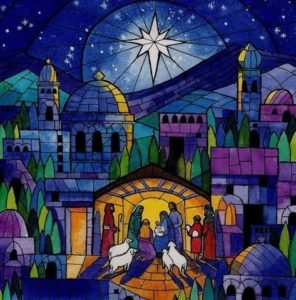 Fiction or non-fiction? Truth or lie? Historical fact or just a myth?Here we are at Christmas time where much of the community, church folk and non-church folk alike, will celebrate the birth of Jesus. And more importantly, we celebrate "the incarnation of God," which is just a fancy way of saying "God became flesh."In recent years I have heard numerous discussions around the historical accuracy of the Bible including the Christmas story. The discussions often revolve around the events which we might consider supernatural."Was Mary really a virgin when she conceived Jesus?" "Did an angel really appear to the shepherds to tell them of Jesus' birth?" "Was Jesus really both a person and God, both human and divine?"Historical fact or just a myth? To the modern mind this question seems pressing. To a society which measures truth by scientific instruments this question begs for a straight answer. We want to know, "Is it fiction or non-fiction, truth or lie, historical fact or just a myth?"Those who can't swallow that the events surrounding Jesus' birth are historically accurate sometimes say, "Oh, the whole Christmas story is just a myth." This is a statement to which I must agree. However, I would say, "It is not JUST a myth. Rather, it is NO LESS than a myth."
Fiction or non-fiction? Truth or lie? Historical fact or just a myth?Here we are at Christmas time where much of the community, church folk and non-church folk alike, will celebrate the birth of Jesus. And more importantly, we celebrate "the incarnation of God," which is just a fancy way of saying "God became flesh."In recent years I have heard numerous discussions around the historical accuracy of the Bible including the Christmas story. The discussions often revolve around the events which we might consider supernatural."Was Mary really a virgin when she conceived Jesus?" "Did an angel really appear to the shepherds to tell them of Jesus' birth?" "Was Jesus really both a person and God, both human and divine?"Historical fact or just a myth? To the modern mind this question seems pressing. To a society which measures truth by scientific instruments this question begs for a straight answer. We want to know, "Is it fiction or non-fiction, truth or lie, historical fact or just a myth?"Those who can't swallow that the events surrounding Jesus' birth are historically accurate sometimes say, "Oh, the whole Christmas story is just a myth." This is a statement to which I must agree. However, I would say, "It is not JUST a myth. Rather, it is NO LESS than a myth."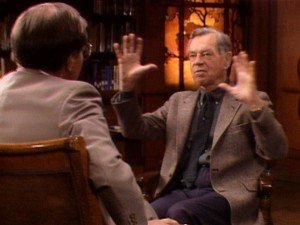 Myths are one of those powerful and profound realities that help shape and give meaning to the experiences of life. Much of the Bible is myth. Which means that it may not be true in an historical or scientific sense. But its truth lies in deeper places, more sacred than instruments can touch.Joseph Campbell, considered the world's leading mythologist, says this: "Mythology is not a lie, mythology is poetry, it is metaphorical. It has been well said that mythology is the penultimate truth--penultimate because the ultimate cannot be put into words. It is beyond words, beyond images...Mythology pitches the mind...to what can be known but not told. So this is the penultimate truth." (The Power of Myth, 1988)In other words, myths point us to the ultimate truth--a truth which lies beyond any story or historical event. We don't believe the Christmas story is true because someone found evidence that Mary really was a virgin, or because it was proven that God really did descend and become human in Jesus. We believe the Christmas story is true because it points to the ultimate truth--a truth we feel and know, but can only express through mythic stories.
Myths are one of those powerful and profound realities that help shape and give meaning to the experiences of life. Much of the Bible is myth. Which means that it may not be true in an historical or scientific sense. But its truth lies in deeper places, more sacred than instruments can touch.Joseph Campbell, considered the world's leading mythologist, says this: "Mythology is not a lie, mythology is poetry, it is metaphorical. It has been well said that mythology is the penultimate truth--penultimate because the ultimate cannot be put into words. It is beyond words, beyond images...Mythology pitches the mind...to what can be known but not told. So this is the penultimate truth." (The Power of Myth, 1988)In other words, myths point us to the ultimate truth--a truth which lies beyond any story or historical event. We don't believe the Christmas story is true because someone found evidence that Mary really was a virgin, or because it was proven that God really did descend and become human in Jesus. We believe the Christmas story is true because it points to the ultimate truth--a truth we feel and know, but can only express through mythic stories.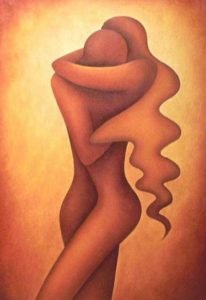 We believe the Christmas myth because it unveils the beautiful dance between the human and her partner, the divine, in each of our lives. We believe the Christmas myth because it reveals the spiritual nature of all births and new beginnings. We believe the Christmas myth because it teaches us about the nature of our lives. It teaches us that God and flesh are not separate and, in fact, are tightly intertwined in such a way that we are "fully human, fully divine."It doesn't matter whether the events surrounding Jesus' birth happened exactly as they are portrayed. All that matters is whether you feel more alive and compassionate when you read it. All that matters is whether it puts you in touch with the human/divine dance playing within you. If it does that then this myth holds more truth than any historical event will ever hold.The Christmas story is not JUST a myth. It is NO LESS than a myth.
We believe the Christmas myth because it unveils the beautiful dance between the human and her partner, the divine, in each of our lives. We believe the Christmas myth because it reveals the spiritual nature of all births and new beginnings. We believe the Christmas myth because it teaches us about the nature of our lives. It teaches us that God and flesh are not separate and, in fact, are tightly intertwined in such a way that we are "fully human, fully divine."It doesn't matter whether the events surrounding Jesus' birth happened exactly as they are portrayed. All that matters is whether you feel more alive and compassionate when you read it. All that matters is whether it puts you in touch with the human/divine dance playing within you. If it does that then this myth holds more truth than any historical event will ever hold.The Christmas story is not JUST a myth. It is NO LESS than a myth.
I Was Once a Stranger...
Mystic Mondays December 12, 2016Dear Readers,The following post is an edited version of a blog post that I written while on my Rome to Rumi pilgrimage in the fall of 2014 just as the political environment was becoming fragile and dangerous in Turkey. Because of recent events regarding the treatment of American Muslims and an intention to dive into my From Rome to Rumi book I have decided to reprint this edited version.Here it is:I woke up in Kesan for my first full day in Turkey after cycling 1,500 miles through Italy and Greece. While eating breakfast the news on the screen above me didn’t look good. German shepherds, tear gas, armored tanks and vandalized storefronts and vehicles filled the screen. I had pedaled my way right into a political crisis. ISIS was attacking the Kurds just over the southern border. The Turkish government was slow to respond and the Turkish people were letting their displeasure be known.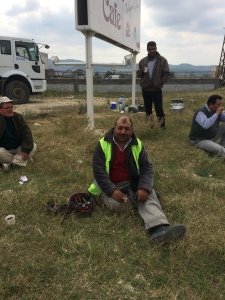 I was in a foreign land. Didn’t speak a word of Turkish and had no idea of how Turkish Muslims would react to an American clad in funny spandex clothing riding through their country at the height of political unrest. I was soon to find out. I hadn’t traveled more than fifteen kilometers when a man with a bald head started gesturing my way with a large loaf of bread. He was inviting me to join him and his road crew for lunch.I wasn’t hungry, but I wasn’t going to pass up this opportunity nor take the risk of offending my new Turkish hosts. I was given a large tray filled with lentil soup, rice, some sort of meatballs and a half loaf of bread. I picked away at the items eating the most easily digestible items first. I didn’t want to stuff myself and find myself vomiting down the road later.Next came an awkward dance. I couldn’t finish my meal, but it was also clear that I hadn’t eaten enough to satisfy some unspoken rule that I could feel in the air. The man to the left of me clearly expected me to eat everything that was put in front of me. The man to the right, who had first waved me over, was trying to guide me through the meal. Finally the message became clear—I could leave everything on my tray except for the meatballs. Those could not be wasted.As soon as I finished the last meatball the man to the right snatched up my tray and shoveled the rest of the food off into the grass. Then he pointed to a herd of goats nearby and gestured between them and his mouth. They had killed a goat for this meal. Cultural and religious protocol demanded that all of it be eaten. The sacrifice of an animal was to not be treated lightly.
I was in a foreign land. Didn’t speak a word of Turkish and had no idea of how Turkish Muslims would react to an American clad in funny spandex clothing riding through their country at the height of political unrest. I was soon to find out. I hadn’t traveled more than fifteen kilometers when a man with a bald head started gesturing my way with a large loaf of bread. He was inviting me to join him and his road crew for lunch.I wasn’t hungry, but I wasn’t going to pass up this opportunity nor take the risk of offending my new Turkish hosts. I was given a large tray filled with lentil soup, rice, some sort of meatballs and a half loaf of bread. I picked away at the items eating the most easily digestible items first. I didn’t want to stuff myself and find myself vomiting down the road later.Next came an awkward dance. I couldn’t finish my meal, but it was also clear that I hadn’t eaten enough to satisfy some unspoken rule that I could feel in the air. The man to the left of me clearly expected me to eat everything that was put in front of me. The man to the right, who had first waved me over, was trying to guide me through the meal. Finally the message became clear—I could leave everything on my tray except for the meatballs. Those could not be wasted.As soon as I finished the last meatball the man to the right snatched up my tray and shoveled the rest of the food off into the grass. Then he pointed to a herd of goats nearby and gestured between them and his mouth. They had killed a goat for this meal. Cultural and religious protocol demanded that all of it be eaten. The sacrifice of an animal was to not be treated lightly.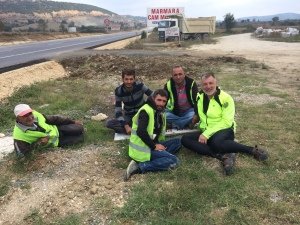 Only later did I discover that what I had been invited into was a celebration of Eid al Adha, “The Festival of Sacrifice” one of two high holy days on the Muslim calendar. One aspect of the celebration is that one-third of the sacrificed goat must go to the stranger, the pilgrim, and the needy. I just happened to come by at the right moment and I was the stranger who took my place in the unfolding drama of this holy celebration. When we parted we shared a deep embrace and the double kiss that is custom in the East. I was a welcome guest in this foreign country.I share this today because in recent weeks we have heard that mosques are being threatened with violence and American Muslims are being targeted for harassment and even hate crimes. It is hard to imagine the Muslim brothers I met that day deserving such treatment and vitriol. They were just the opposite of the stereotypes we have concocted.What I experienced that first day in riding into Turkey became the pattern for the next three weeks as I cycled into the heart of Turkey. I was repeatedly invited to share tea with shop owners and random people I had met. I was welcomed into mosques to pray without any hesitation or wariness on their part.“Welcoming the stranger” is a way of life for the vast majority of Muslims. It’s a cultural expectation and a religious responsibility. I will forever remember my three weeks of being welcomed by Muslim brothers and sisters in Turkey in the middle of a political crisis.Now it’s our turn. Let’s return the favor.
Only later did I discover that what I had been invited into was a celebration of Eid al Adha, “The Festival of Sacrifice” one of two high holy days on the Muslim calendar. One aspect of the celebration is that one-third of the sacrificed goat must go to the stranger, the pilgrim, and the needy. I just happened to come by at the right moment and I was the stranger who took my place in the unfolding drama of this holy celebration. When we parted we shared a deep embrace and the double kiss that is custom in the East. I was a welcome guest in this foreign country.I share this today because in recent weeks we have heard that mosques are being threatened with violence and American Muslims are being targeted for harassment and even hate crimes. It is hard to imagine the Muslim brothers I met that day deserving such treatment and vitriol. They were just the opposite of the stereotypes we have concocted.What I experienced that first day in riding into Turkey became the pattern for the next three weeks as I cycled into the heart of Turkey. I was repeatedly invited to share tea with shop owners and random people I had met. I was welcomed into mosques to pray without any hesitation or wariness on their part.“Welcoming the stranger” is a way of life for the vast majority of Muslims. It’s a cultural expectation and a religious responsibility. I will forever remember my three weeks of being welcomed by Muslim brothers and sisters in Turkey in the middle of a political crisis.Now it’s our turn. Let’s return the favor.
Thanks Diana Butler Bass
Mystic Mondays December 5, 2016
"I feel like I am trying to find my voice again."
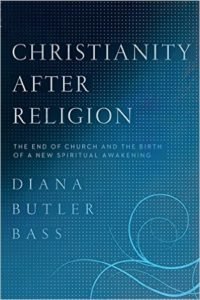 Those were the words (or something close) of Diana Butler Bass last week on a Facebook post. Butler Bass is the author of at least ten books on culture and religion and a person who is considered to have a finger on the pulse of the American religious landscape. I had been feeling those same words in recent months and especially acutely since waking up on November 9. I had wondered what was going on with me. I breathed a sigh of relief when the great Diana Butler Bass was also feeling a bit lost.This has really rattled me. I have spent recent years following a call to find a new way to be a religious voice in the community. It is my chosen profession and my deepest passion. I have two religious degrees and two decades of experience serving as a pastor of Protestant churches. Yet in recent years the pulpit has slowly transformed from the moral centerpiece of the community to the exclusive property of church members.In many ways my pilgrimages and blogging have been my way of building a new pulpit that speaks not only to the faithful within church walls, but to a whole community seeking spiritual reflection and growth. I thought I knew what I was doing. I was exploring the modern return of ancient religious mysticism. I was speaking the language of the "spiritual but not religious." I was carving out a new voice for myself in this changing religious and cultural landscape.And then November 9 happened. Trump crashed a party I didn't even know we were having. A political and spiritual earthquake shook us to the core.And now I feel lost. What the hell does mysticism have to do with our new reality? Do terms like "spiritual but not religious" have any meaning in this new world? Will it really matter? Is the only thing that matters now whether one is for Trump or against?
Those were the words (or something close) of Diana Butler Bass last week on a Facebook post. Butler Bass is the author of at least ten books on culture and religion and a person who is considered to have a finger on the pulse of the American religious landscape. I had been feeling those same words in recent months and especially acutely since waking up on November 9. I had wondered what was going on with me. I breathed a sigh of relief when the great Diana Butler Bass was also feeling a bit lost.This has really rattled me. I have spent recent years following a call to find a new way to be a religious voice in the community. It is my chosen profession and my deepest passion. I have two religious degrees and two decades of experience serving as a pastor of Protestant churches. Yet in recent years the pulpit has slowly transformed from the moral centerpiece of the community to the exclusive property of church members.In many ways my pilgrimages and blogging have been my way of building a new pulpit that speaks not only to the faithful within church walls, but to a whole community seeking spiritual reflection and growth. I thought I knew what I was doing. I was exploring the modern return of ancient religious mysticism. I was speaking the language of the "spiritual but not religious." I was carving out a new voice for myself in this changing religious and cultural landscape.And then November 9 happened. Trump crashed a party I didn't even know we were having. A political and spiritual earthquake shook us to the core.And now I feel lost. What the hell does mysticism have to do with our new reality? Do terms like "spiritual but not religious" have any meaning in this new world? Will it really matter? Is the only thing that matters now whether one is for Trump or against?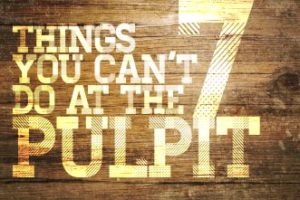 And what about that church pulpit that has felt more and more pushed to the sidelines of American politics and culture in recent decades? Will pulpits be defined by how closely they cozy up to Trump or how often they criticize Trump through veiled references? Will churches find themselves even further down the path of irrelevancy as they preach a soft neutrality and half-truths? Or will preachers once again claim that once sacred and honored tradition to be the moral voice for the community holding our leaders to a higher standard of ethical and spiritual character? Will we preach the gospel with no concern for who it offends or doesn't offend only seeking to please God Herself."I feel like I am trying to find my voice again," writes Diana Butler Bass. If she, who has had one of the clearest and most distinctive voices in our culture, is questioning her voice I wonder how much we all are questioning our voices, our choices and our priorities. She is rattled. I am rattled. I wonder if you all are rattled too. Here are the questions I am now asking:"Can I continue to write under a title 'Mystic Mondays' and feel that it has any relevance to our time?""What is my voice now? Is to renew that prophetic role from the pulpit that first drew me to preaching? Is it to take my blogging and speaking a whole new direction?""Are there things more important than work and financial security?""What are the risks of doing something? What are the risks of not doing something?""Shall I retreat from political responsibility into bike riding, guitar playing and family and friends and hope all this just passes?""Shall I buckle down for the long haul and commit to fighting a war that feels imminent?"
And what about that church pulpit that has felt more and more pushed to the sidelines of American politics and culture in recent decades? Will pulpits be defined by how closely they cozy up to Trump or how often they criticize Trump through veiled references? Will churches find themselves even further down the path of irrelevancy as they preach a soft neutrality and half-truths? Or will preachers once again claim that once sacred and honored tradition to be the moral voice for the community holding our leaders to a higher standard of ethical and spiritual character? Will we preach the gospel with no concern for who it offends or doesn't offend only seeking to please God Herself."I feel like I am trying to find my voice again," writes Diana Butler Bass. If she, who has had one of the clearest and most distinctive voices in our culture, is questioning her voice I wonder how much we all are questioning our voices, our choices and our priorities. She is rattled. I am rattled. I wonder if you all are rattled too. Here are the questions I am now asking:"Can I continue to write under a title 'Mystic Mondays' and feel that it has any relevance to our time?""What is my voice now? Is to renew that prophetic role from the pulpit that first drew me to preaching? Is it to take my blogging and speaking a whole new direction?""Are there things more important than work and financial security?""What are the risks of doing something? What are the risks of not doing something?""Shall I retreat from political responsibility into bike riding, guitar playing and family and friends and hope all this just passes?""Shall I buckle down for the long haul and commit to fighting a war that feels imminent?"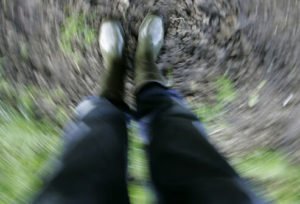 A month ago the world changed. How much, I just don't know yet. What I do know is that the things that have helped me keep my bearings have either been shattered or shaken up. I don't know which way is up any longer. I vacillate back and forth between an engaged anger at one moment to a crumpled mass of nervous, useless flesh at other moments. What felt real a month ago has vanished like steam. A world that made sense a few weeks ago now seems more like a jostled Scrabble board.Here's what I promise you, however. I will keep writing. I will keep sharing my confusion. I will feel and experiment and write my way through this. If I am angry that's what you'll get. If I am in a fighting mood that's what you'll read about. If I happen to see some deeper mystical purpose in all of this I promise not to keep it to myself. I will tell if I am feeling despondent just as easily as if I am feeling tenacious. And hopefully, word by word, feeling by feeling, day by day, it will all make sense again.The truth is I never really lost my voice. This is my voice. It won't always be pretty. But you can be damn sure that it will be honest.Thanks, Diana, for being honest too.
A month ago the world changed. How much, I just don't know yet. What I do know is that the things that have helped me keep my bearings have either been shattered or shaken up. I don't know which way is up any longer. I vacillate back and forth between an engaged anger at one moment to a crumpled mass of nervous, useless flesh at other moments. What felt real a month ago has vanished like steam. A world that made sense a few weeks ago now seems more like a jostled Scrabble board.Here's what I promise you, however. I will keep writing. I will keep sharing my confusion. I will feel and experiment and write my way through this. If I am angry that's what you'll get. If I am in a fighting mood that's what you'll read about. If I happen to see some deeper mystical purpose in all of this I promise not to keep it to myself. I will tell if I am feeling despondent just as easily as if I am feeling tenacious. And hopefully, word by word, feeling by feeling, day by day, it will all make sense again.The truth is I never really lost my voice. This is my voice. It won't always be pretty. But you can be damn sure that it will be honest.Thanks, Diana, for being honest too.
An Outdoor Spirituality
Mystic Mondays November 28, 2016 (Post-Thanksgiving Lazy Edition)About two years I added into my daily time of morning meditation (and strong cup of coffee) a practice of reading just a page or two of some writer who transports me to a more reflective place. Currently I am about halfway through the late Irish poet and theologian, John O' Donohue's, Eternal Echoes: Exploring Our Yearning to Belong.Many lines of his give me something to ponder each day, but a line yesterday really tweaked my interest. Writing on the topic of Celtic spirituality he says,
It is interesting to reflect that the Celts were not taken with the construction of great architecture. They loved the vitality and magic of open spaces. Celtic spirituality is an outdoor spirituality.
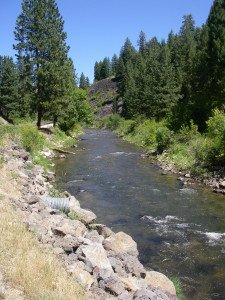 I live in the great Pacific Northwest known for its stunning physical beauty, relatively mild seasons (anything is mild compared to Wisconsin!), and year round recreational opportunities. People here love to hike, bike, kayak, bird watch, camp, ski, snowshoe, garden, dig for clams, drink coffee at open air cafes, and even walk in the rain! Nature is...well...second nature to Oregonians.Oregon is also known for having one of the highest percentages of religiously unaffiliated in the entire country. I don't think this is a coincidence. If you had the choice of hiking to a waterfall or sitting in a pew listening even to a well-delivered sermon chances are most Oregonians would choose the trek to the waterfall.I have only been in Oregon for fourteen years, but I know that I fit the typical Pacific Northwest stereotype. When I can get away on the weekend you will find me cycling, hiking or snowshoeing, depending on the season. I resonate with O' Donohue and his understanding of Celtic spirituality being an outdoor spirituality. My adventures out on the trails or on the roads don't feel like just the required exercise that the doctor ordered. I immerse myself in the sensual experience of nature to restore my soul, remind myself of the earth's rhythms and distance myself from the abusive noises that come from city life.
I live in the great Pacific Northwest known for its stunning physical beauty, relatively mild seasons (anything is mild compared to Wisconsin!), and year round recreational opportunities. People here love to hike, bike, kayak, bird watch, camp, ski, snowshoe, garden, dig for clams, drink coffee at open air cafes, and even walk in the rain! Nature is...well...second nature to Oregonians.Oregon is also known for having one of the highest percentages of religiously unaffiliated in the entire country. I don't think this is a coincidence. If you had the choice of hiking to a waterfall or sitting in a pew listening even to a well-delivered sermon chances are most Oregonians would choose the trek to the waterfall.I have only been in Oregon for fourteen years, but I know that I fit the typical Pacific Northwest stereotype. When I can get away on the weekend you will find me cycling, hiking or snowshoeing, depending on the season. I resonate with O' Donohue and his understanding of Celtic spirituality being an outdoor spirituality. My adventures out on the trails or on the roads don't feel like just the required exercise that the doctor ordered. I immerse myself in the sensual experience of nature to restore my soul, remind myself of the earth's rhythms and distance myself from the abusive noises that come from city life.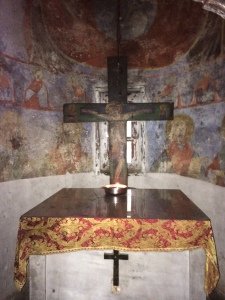 But I am also a pastor who is responsible for nurturing a church spirituality among my congregation and in my community. Despite my sometimes critical voice about the church's increasing irrelevance among moderns (especially in the Northwest) I also relish the spirituality that emerges from gathering around a common table. I hold a real reverence for the place and the power of the pulpit to speak truth in a culture where lies and truth are getting difficult to distinguish. And I cherish the spirituality of compassion that gets lived out between members during the rawest times of life and the most celebrated.The church where I am currently serving as a pastor has started an Earth Adventurers group that now has over 100 loosely committed individuals from Southern Oregon. The thread that holds them together is both broad and simple: Do you experience God or the Sacred in nature and want to join others in activities that honor our connection to and enjoyment of the earth?But I am noticing a familiar pattern. In years past it seemed to me that I had a church spirituality and an outdoor (or Celtic) spirituality, but that the two didn't mix well. On Saturdays I practiced my outdoor spirituality and then rushed home in time to write a sermon so that on Sunday I was ready to lead my congregation in their church spirituality.
But I am also a pastor who is responsible for nurturing a church spirituality among my congregation and in my community. Despite my sometimes critical voice about the church's increasing irrelevance among moderns (especially in the Northwest) I also relish the spirituality that emerges from gathering around a common table. I hold a real reverence for the place and the power of the pulpit to speak truth in a culture where lies and truth are getting difficult to distinguish. And I cherish the spirituality of compassion that gets lived out between members during the rawest times of life and the most celebrated.The church where I am currently serving as a pastor has started an Earth Adventurers group that now has over 100 loosely committed individuals from Southern Oregon. The thread that holds them together is both broad and simple: Do you experience God or the Sacred in nature and want to join others in activities that honor our connection to and enjoyment of the earth?But I am noticing a familiar pattern. In years past it seemed to me that I had a church spirituality and an outdoor (or Celtic) spirituality, but that the two didn't mix well. On Saturdays I practiced my outdoor spirituality and then rushed home in time to write a sermon so that on Sunday I was ready to lead my congregation in their church spirituality.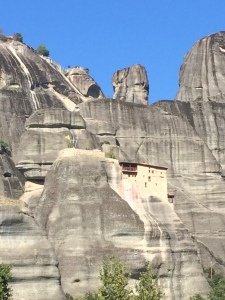 The same is becoming true for the Earth Adventurers and Bethany church. Despite my involvement in both communities I find it challenging to describe the spirituality of the church to the Earth Adventurers and, vice versa, difficult to describe the spirituality of the Earth Adventurers to the church in a way that both groups would go, "Aha. I get it!"I will admit that this post is basically a challenge to both the church faithful and the earth faithful and a cheer to those of you who fit in both camps simultaneously.I have a dream (nothing on par with MLK, mind you!). I have a dream that someday I won't have an outdoor spirituality and a church spirituality. I will just have a spirituality--a spirituality that experiences the Sacred in nature, around a communion table, sitting at the bedside of a sick patient, and preaching from a wooden pulpit.I have a dream that someday Pacific Northwesterners won't have to choose between meeting God on the trail or in the pews on Sundays. I have a dream that one day church won't be defined by walls, but by meeting God on the road of life. I have a dream that the church will start looking for God outside rather than expecting God to take up a seat inside.
The same is becoming true for the Earth Adventurers and Bethany church. Despite my involvement in both communities I find it challenging to describe the spirituality of the church to the Earth Adventurers and, vice versa, difficult to describe the spirituality of the Earth Adventurers to the church in a way that both groups would go, "Aha. I get it!"I will admit that this post is basically a challenge to both the church faithful and the earth faithful and a cheer to those of you who fit in both camps simultaneously.I have a dream (nothing on par with MLK, mind you!). I have a dream that someday I won't have an outdoor spirituality and a church spirituality. I will just have a spirituality--a spirituality that experiences the Sacred in nature, around a communion table, sitting at the bedside of a sick patient, and preaching from a wooden pulpit.I have a dream that someday Pacific Northwesterners won't have to choose between meeting God on the trail or in the pews on Sundays. I have a dream that one day church won't be defined by walls, but by meeting God on the road of life. I have a dream that the church will start looking for God outside rather than expecting God to take up a seat inside.
Thank you, dear Leonard...
Mystic Mondays November 21, 2016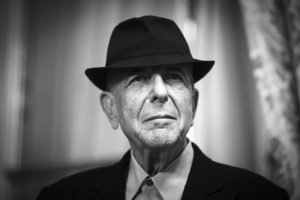 I was late to the party when it came to Leonard Cohen. In fact, I only heard of him for the first time when hearing the Jeff Buckley version of Hallelujah in about 2007. In the next few years I think I bought six CD's of Cohen's music and the DVD version of his "Live in London" performance. At the time I also didn't know that he had spent years in a Buddhist monastery and become a Buddhist monk himself. But I knew that his haunting and playful lyrics had a soulful, spiritual, even religious, quality to them. I swore that I could feel the same Presence underneath his music that I relied on when preaching.Leonard Cohen died on November 7--the day before the election. I don't know if he had an inkling of what was to come and just wanted out, but I do know that a quiet prophetic truth would have poured out of him. Cohen had that ability to name hidden realities that most of us can feel but not quite name. Hallelujah is probably his most popular example:
I was late to the party when it came to Leonard Cohen. In fact, I only heard of him for the first time when hearing the Jeff Buckley version of Hallelujah in about 2007. In the next few years I think I bought six CD's of Cohen's music and the DVD version of his "Live in London" performance. At the time I also didn't know that he had spent years in a Buddhist monastery and become a Buddhist monk himself. But I knew that his haunting and playful lyrics had a soulful, spiritual, even religious, quality to them. I swore that I could feel the same Presence underneath his music that I relied on when preaching.Leonard Cohen died on November 7--the day before the election. I don't know if he had an inkling of what was to come and just wanted out, but I do know that a quiet prophetic truth would have poured out of him. Cohen had that ability to name hidden realities that most of us can feel but not quite name. Hallelujah is probably his most popular example:
I've seen your flag on the marble arch,But love is not a victory march,It's a cold and it's a broken hallelujah.
"Broken hallelujah." Was there ever a more perfect description of the complex nature of life? Beauty and brokenness. Heaven and hell. Creation and Fall.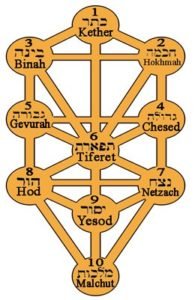 I listened to the last interview he gave this fall in the final weeks of his life. David Remnick of The New Yorker conducted the interview while Cohen was in great pain and in his usual reflective, self-effacing form. I wasn't surprised when Remnick told Cohen that many of his songs sounded like prayers and wondered whether Cohen had intended any religious meaning. Cohen quickly dismissed the idea, but then added that subconsciously themes from his Jewish tradition couldn't help but to seep into his writing. Then he said this about the mystic tradition (Kabbalism) of Judaism:
I listened to the last interview he gave this fall in the final weeks of his life. David Remnick of The New Yorker conducted the interview while Cohen was in great pain and in his usual reflective, self-effacing form. I wasn't surprised when Remnick told Cohen that many of his songs sounded like prayers and wondered whether Cohen had intended any religious meaning. Cohen quickly dismissed the idea, but then added that subconsciously themes from his Jewish tradition couldn't help but to seep into his writing. Then he said this about the mystic tradition (Kabbalism) of Judaism:
One of the great themes of Kabbalistic thought is the repair of God. God, in creation the world, dispersed itself. The Creation is a catastrophe. There are pieces of him or her or it that are everywhere, in fact. The specific task of the Jew is to repair the face of God. The prayers are to remind God that it was once a harmonious unity.
Wow!Does that turn your theology on its head or what? In much of Christianity God is perfect, the world is a catastrophe, and God takes the responsibility to heal the world. In Kabbalistic Judaism it is God who is broken and we who have the responsibility to put God back together again like Humpty Dumpty who had a great fall! I am thinking about this in light of this election and the feeling among many of us that a great earthquake has shook us and torn the moorings from our cultural, political and spiritual boats. We are all trying to make sense of this and come to terms with it in our own ways. I have heard from some who have fallen back on their faith and reminded us that "God is in control." We may be in for a real mess, but we can always depend on the God of the heavens to ultimately take care of things in His own time and in His own way.I do understand this faith. When life becomes more complex than our little brains can handle there is a threshold where we give up trying to have answers. There is a place of trust where we let go and say, "God's got this one because I sure can't figure it out."But as you know I have been inching my way closer and closer to the mystical arms of our religious traditions. It started with experiences for which I had no words. It then led me on a pilgrimage of discovery of Rumi, the late Persian poet in the Islamic Sufi mystic tradition. And recently I have discovered the long lost Christian mystics of the Orthodox faith.
I am thinking about this in light of this election and the feeling among many of us that a great earthquake has shook us and torn the moorings from our cultural, political and spiritual boats. We are all trying to make sense of this and come to terms with it in our own ways. I have heard from some who have fallen back on their faith and reminded us that "God is in control." We may be in for a real mess, but we can always depend on the God of the heavens to ultimately take care of things in His own time and in His own way.I do understand this faith. When life becomes more complex than our little brains can handle there is a threshold where we give up trying to have answers. There is a place of trust where we let go and say, "God's got this one because I sure can't figure it out."But as you know I have been inching my way closer and closer to the mystical arms of our religious traditions. It started with experiences for which I had no words. It then led me on a pilgrimage of discovery of Rumi, the late Persian poet in the Islamic Sufi mystic tradition. And recently I have discovered the long lost Christian mystics of the Orthodox faith.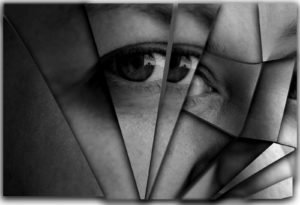 And now this! Cohen is introducing me to Jewish mysticism and I find there is something deeply attractive about this image that this chaotic, broken world that we inhabit is not somehow set off from God but may actually be the shattered face of God. We may be walking on God's broken heart. The wounds of the world may actually be the wounded soul of God's own self.Of course, whether we prefer the God in the Sky of traditional Christianity or the broken God of Jewish mysticism we recognize that they are just images. But something happens when I think of the brokenness of God. Rather than feeling guilt for the mess we have made (the doctrine of the Fall) I feel a deep sense of compassion FOR God. I feel a responsibility to God. If God's heart is broken I cannot but help to want to heal God's eternal wound. And if God's face is shattered into a million pieces I cannot but help to want to pick up the pieces and start putting Humpty Dumpty back together again.What if God isn't actually in control? What if God needs us more than ever? What if we hold the trump card?Thank you, dear Leonard for living your life as a prayer.
And now this! Cohen is introducing me to Jewish mysticism and I find there is something deeply attractive about this image that this chaotic, broken world that we inhabit is not somehow set off from God but may actually be the shattered face of God. We may be walking on God's broken heart. The wounds of the world may actually be the wounded soul of God's own self.Of course, whether we prefer the God in the Sky of traditional Christianity or the broken God of Jewish mysticism we recognize that they are just images. But something happens when I think of the brokenness of God. Rather than feeling guilt for the mess we have made (the doctrine of the Fall) I feel a deep sense of compassion FOR God. I feel a responsibility to God. If God's heart is broken I cannot but help to want to heal God's eternal wound. And if God's face is shattered into a million pieces I cannot but help to want to pick up the pieces and start putting Humpty Dumpty back together again.What if God isn't actually in control? What if God needs us more than ever? What if we hold the trump card?Thank you, dear Leonard for living your life as a prayer.
Life After the Earthquake...
Mystic Mondays November 14, 2016On Wednesday I had a counseling appointment and spent half of the $150/hour time in an uncontrollable bawl-fest that I think left both me and my counselor exhausted. I knew it had to do with the election, but I could not put words to it at first. As we dug down to the mother lode we struck emotional gold. My gut-wrenching episode had to do with the enormous sense of responsibility I felt to my congregation.I was mad at God for putting me in this position.I knew that many would be licking their wounds and wondering what train had run over them. I also knew that just as many were quietly celebrating that America had finally heard them. Our congregation is a microcosm of American society--passionate citizens on both sides of the Republican/Democrat divide.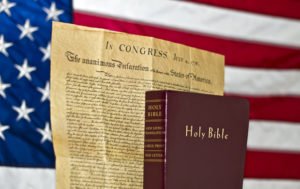 It was tough getting there, but by Saturday I knew that I had to address the election from the pulpit. I knew that some would be concerned (given my equally passionate and vocal opposition to Donald Trump's campaign in my blog) that I might use the pulpit to criticize our president elect. I also knew that others were feeling paralyzed by their inability to reconcile their commitment to their Christian faith and their patriotic duty to support the the president elect.I needed to say something about how the church would respond and how I would use my pulpit in the coming months and years. I needed to find a way to set the tone so that we could move through this time with some semblance of grace. Here is the letter I read to the congregation yesterday morning. I hope you find it helpful as you also consider the delicate line between faith and politics.Dear Bethany Friends,It certainly would be the understatement of the year to acknowledge that much of America feels like a political, spiritual and cultural earthquake hit us this election. Facebook has lit up with a combination of anger and grief on one side and relief and great hope on the other side. It is too early to tell just how long the aftershocks of this earthquake will reverberate through our communities and nation.As I prepared for today I felt a deep sense of responsibility. If I say nothing about what just happened I feel that I would not be living up to my pastoral duty to offer something hopeful from the gospel to an issue that has rocked us to the very core. On the other hand if I step into this political fray I run the risk of alienating some in the congregation and further dividing us just when we are working hard to come together.What I want to assure you today is that the events of this past week are not going to change who I am, what I preach and the gospel that I have staked my life on. I have no interest in either personally challenging the president-elect or in endorsing him from the pulpit.Having said that, however, there are already signs across our country that one outcome of this election is that some Americans are feeling threatened and other Americans are now feeling permission to personally attack fellow citizens. Women and girls are being grabbed and told, “If our president can do it, I can do it.” African-Americans are being harassed and freely called the “N” word. Muslim women are having their head scarves and hajibs torn from their bodies. And protesters are vandalizing businesses, vehicles and public property. This is more than just a political issue. This is a spiritual and moral issue.If I say nothing in this time I will forever carry on my conscience that I stood by and asked Bethany to stand by silently while we Americans tear each other apart. What I want to assure you is that nothing has changed for me. I will continue to preach the gospel of Jesus Christ, a gospel that calls us to “Love our neighbor as ourselves.” I will continue to hold up the life and ministry of Jesus Christ, a life that tore down the “dividing walls of hostility.” I will continue to preach that there is no longer Jew or Greek, slave or free, male and female, for we are all one in Jesus Christ.” I will continue to dream of a time when the Kingdom of God is realized where we lift each other up rather than tear each other down.I also will continue to preach that humiliating others, calling people names, stroking the fires of fear, and making racist, sexist, and misogynistic comments is a direct affront to the gospel of Jesus Christ. My intention is neither to endorse nor to oppose a particular political person from the pulpit. My intention is simply to raise up the gospel of Jesus Christ and hold all Americans to the same standard—Republican and Democrat, the taxicab driver, the elementary school teacher, the local police officer, and, yes, even the President of the United States. If we call ourselves Christian then character matters!As long as I am in this pulpit I will not remain silent while we Americans are attacking, humiliating, demonizing or threatening each other with harm. I am responsible to preach the gospel. Our leaders are responsible for our democracy. I will try to live up to standards of Jesus Christ and pray that our leaders will live up to the standards of the American way.My friends, I want to assure you that this election has not changed the words that will come from this pulpit. I am a preacher of the gospel of Jesus Christ. I can do no other. You should expect nothing less.May God guide us and give us courage as we move through this time together. Amen.
It was tough getting there, but by Saturday I knew that I had to address the election from the pulpit. I knew that some would be concerned (given my equally passionate and vocal opposition to Donald Trump's campaign in my blog) that I might use the pulpit to criticize our president elect. I also knew that others were feeling paralyzed by their inability to reconcile their commitment to their Christian faith and their patriotic duty to support the the president elect.I needed to say something about how the church would respond and how I would use my pulpit in the coming months and years. I needed to find a way to set the tone so that we could move through this time with some semblance of grace. Here is the letter I read to the congregation yesterday morning. I hope you find it helpful as you also consider the delicate line between faith and politics.Dear Bethany Friends,It certainly would be the understatement of the year to acknowledge that much of America feels like a political, spiritual and cultural earthquake hit us this election. Facebook has lit up with a combination of anger and grief on one side and relief and great hope on the other side. It is too early to tell just how long the aftershocks of this earthquake will reverberate through our communities and nation.As I prepared for today I felt a deep sense of responsibility. If I say nothing about what just happened I feel that I would not be living up to my pastoral duty to offer something hopeful from the gospel to an issue that has rocked us to the very core. On the other hand if I step into this political fray I run the risk of alienating some in the congregation and further dividing us just when we are working hard to come together.What I want to assure you today is that the events of this past week are not going to change who I am, what I preach and the gospel that I have staked my life on. I have no interest in either personally challenging the president-elect or in endorsing him from the pulpit.Having said that, however, there are already signs across our country that one outcome of this election is that some Americans are feeling threatened and other Americans are now feeling permission to personally attack fellow citizens. Women and girls are being grabbed and told, “If our president can do it, I can do it.” African-Americans are being harassed and freely called the “N” word. Muslim women are having their head scarves and hajibs torn from their bodies. And protesters are vandalizing businesses, vehicles and public property. This is more than just a political issue. This is a spiritual and moral issue.If I say nothing in this time I will forever carry on my conscience that I stood by and asked Bethany to stand by silently while we Americans tear each other apart. What I want to assure you is that nothing has changed for me. I will continue to preach the gospel of Jesus Christ, a gospel that calls us to “Love our neighbor as ourselves.” I will continue to hold up the life and ministry of Jesus Christ, a life that tore down the “dividing walls of hostility.” I will continue to preach that there is no longer Jew or Greek, slave or free, male and female, for we are all one in Jesus Christ.” I will continue to dream of a time when the Kingdom of God is realized where we lift each other up rather than tear each other down.I also will continue to preach that humiliating others, calling people names, stroking the fires of fear, and making racist, sexist, and misogynistic comments is a direct affront to the gospel of Jesus Christ. My intention is neither to endorse nor to oppose a particular political person from the pulpit. My intention is simply to raise up the gospel of Jesus Christ and hold all Americans to the same standard—Republican and Democrat, the taxicab driver, the elementary school teacher, the local police officer, and, yes, even the President of the United States. If we call ourselves Christian then character matters!As long as I am in this pulpit I will not remain silent while we Americans are attacking, humiliating, demonizing or threatening each other with harm. I am responsible to preach the gospel. Our leaders are responsible for our democracy. I will try to live up to standards of Jesus Christ and pray that our leaders will live up to the standards of the American way.My friends, I want to assure you that this election has not changed the words that will come from this pulpit. I am a preacher of the gospel of Jesus Christ. I can do no other. You should expect nothing less.May God guide us and give us courage as we move through this time together. Amen.
Outer and Inner...
Mystic Mondays November 7, 2016
"They (psychology, philosophy and religion) concern themselves with the outer meaning of the world, the inner meaning of the soul, and the threshold where the two meet." John O' Donohue in Eternal Echoes
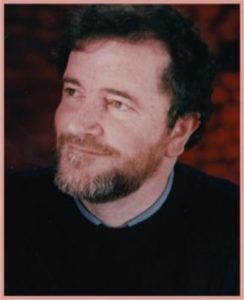 I read that line yesterday morning in the middle of my daily practice of meditation and opening myself to some stream-of-consciousness journaling. I immediately sat straight up as I recognized it. It mirrored both in intention and in words the tagline that I use at the bottom of my PedalPilgrim emails and on my website: Exploring the World, Discovering the Soul.I remember when my business coach and I came up with this line after weeks of brainstorming, trying on words, and exploring the chords they struck. We had circled around it a number of times as I found myself repeating over and over that this work, this call, this inner prodding that I feel has something to do with "going out and coming back" and finding the right balance between the two. Too much emphasis on one or the other left me feeling uneasy. As much as I love adventures it wasn't satisfying to just flit from one adventure to another like a travel writer. On the other hand, a life of just responding to the often narrow parochial concerns of church life left me feeling claustrophobic.It wasn't either life on the road that I wanted or life in the local parish. It was something about living on the bridge between the two, something about the threshold between the outer world and the inner world that seems to be driving this restless passionate pursuit that I have.
I read that line yesterday morning in the middle of my daily practice of meditation and opening myself to some stream-of-consciousness journaling. I immediately sat straight up as I recognized it. It mirrored both in intention and in words the tagline that I use at the bottom of my PedalPilgrim emails and on my website: Exploring the World, Discovering the Soul.I remember when my business coach and I came up with this line after weeks of brainstorming, trying on words, and exploring the chords they struck. We had circled around it a number of times as I found myself repeating over and over that this work, this call, this inner prodding that I feel has something to do with "going out and coming back" and finding the right balance between the two. Too much emphasis on one or the other left me feeling uneasy. As much as I love adventures it wasn't satisfying to just flit from one adventure to another like a travel writer. On the other hand, a life of just responding to the often narrow parochial concerns of church life left me feeling claustrophobic.It wasn't either life on the road that I wanted or life in the local parish. It was something about living on the bridge between the two, something about the threshold between the outer world and the inner world that seems to be driving this restless passionate pursuit that I have.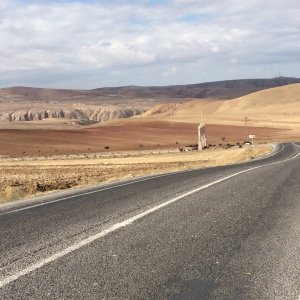 I have come to believe that these callings that nag at us persistently are often rooted in our own personal stories. Our soul has a way of pushing us into landscapes that heal old wounds and invite unresolved issues to rise to the surface.This language of outer and inner is important to me. I grew up in a home that looked pretty normal from the street. To the outside observer we were the typical American family--two parents and two children in a small three-bedroom house in a growing Front Range town in Northern Colorado. But divorce and depression had invaded our home early in my childhood. We kept it well-hidden or so we thought. The picture perfect family of four hid the soullessness and emotional deadness that reigned deep inside of us. Still to this day I can remember the walls, the rooms, and the placement of furniture. But I cannot access any feelings associated with that house except a long drawn-out emotionless existence.What does this have to do with John O'Donohue's quote and my website tagline, you rightly ask? My work and calling have been shaped by this deep distrust of anything that looks pretty on the outside, but lacks a vitality, a spirit, a soulfulness, and life on the inside. Some say that I have developed a pretty sophisticated bullshit detector. I think there is some truth to that. I prefer to think of it not so much as being able to recognize bullshit when it's hidden away, but simply to recognize the deeper truth, the deeper reality, and the unsaid things that we often can feel, but can't put words to.
I have come to believe that these callings that nag at us persistently are often rooted in our own personal stories. Our soul has a way of pushing us into landscapes that heal old wounds and invite unresolved issues to rise to the surface.This language of outer and inner is important to me. I grew up in a home that looked pretty normal from the street. To the outside observer we were the typical American family--two parents and two children in a small three-bedroom house in a growing Front Range town in Northern Colorado. But divorce and depression had invaded our home early in my childhood. We kept it well-hidden or so we thought. The picture perfect family of four hid the soullessness and emotional deadness that reigned deep inside of us. Still to this day I can remember the walls, the rooms, and the placement of furniture. But I cannot access any feelings associated with that house except a long drawn-out emotionless existence.What does this have to do with John O'Donohue's quote and my website tagline, you rightly ask? My work and calling have been shaped by this deep distrust of anything that looks pretty on the outside, but lacks a vitality, a spirit, a soulfulness, and life on the inside. Some say that I have developed a pretty sophisticated bullshit detector. I think there is some truth to that. I prefer to think of it not so much as being able to recognize bullshit when it's hidden away, but simply to recognize the deeper truth, the deeper reality, and the unsaid things that we often can feel, but can't put words to.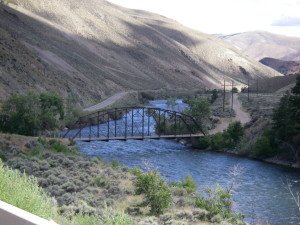 It is no surprise really that I was attracted to the world of religion early in college. Religion connects our outer reality with the deeper, inner realities. Religion ("religio"-- to bind or integrate) is interested in the threshold, the bridge, and the connection between our inner impulses and the outer world that we create.Like many of us in the helping professions my immersion in the world of religion emerged out of my need to heal the great disparity between my inner and outer worlds. But this is not just my issue. We Americans are a very schizophrenic people. We are experts at presenting picture perfect fronts while experiencing spiritual poverty. We trick ourselves into believing that we have it all together while suffering from addictions, deadening our souls with medications, and ignoring symptoms of personal and societal disorders.John O'Donahue says that religion is concerned with the outer meaning of the world and the inner meaning of the soul and the threshold where the two meet. Three years I came up with that tagline to define this nagging call and work that I do. There is something about this threshold between the world and the soul that keeps me on this journey of discovery.I wonder if this threshold between the outer and the inner is where God is found. I wonder if where the world and the soul kiss is where Life is conceived.
It is no surprise really that I was attracted to the world of religion early in college. Religion connects our outer reality with the deeper, inner realities. Religion ("religio"-- to bind or integrate) is interested in the threshold, the bridge, and the connection between our inner impulses and the outer world that we create.Like many of us in the helping professions my immersion in the world of religion emerged out of my need to heal the great disparity between my inner and outer worlds. But this is not just my issue. We Americans are a very schizophrenic people. We are experts at presenting picture perfect fronts while experiencing spiritual poverty. We trick ourselves into believing that we have it all together while suffering from addictions, deadening our souls with medications, and ignoring symptoms of personal and societal disorders.John O'Donahue says that religion is concerned with the outer meaning of the world and the inner meaning of the soul and the threshold where the two meet. Three years I came up with that tagline to define this nagging call and work that I do. There is something about this threshold between the world and the soul that keeps me on this journey of discovery.I wonder if this threshold between the outer and the inner is where God is found. I wonder if where the world and the soul kiss is where Life is conceived.
No Preacher Needed
Mystic Mondays October 31, 2016I think I saw a glimpse of the future yesterday morning.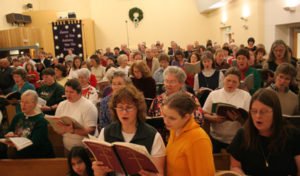 The church where I serve decided to use the 5th Sunday of the month as time to experiment a little. I have served churches before where the 5th Sunday is used as an Old-Fashioned Hymn Sing. It often comes at the request of older members who miss the cherished hymns of their childhood and early childrearing days. I get it! I grew up on the music of John Denver, Dan Fogelberg, Bread, and the Carpenters. I still find myself humming, "Take Me Home, Country Roads" and "Run for the Roses."But Bethany put just enough of a twist in this 5th Sunday Old-Fashioned Hymn Sing to make it feel less like a retreat into memory lane and more like a foretaste of the future. We did sing a handful of oldies and personal favorites, but the worship planners also invited poets and wannabe poets to share on the theme of "Saints Among Us" given that All Saints Day was just two days hence.What seven poets offered yesterday far outshone anything this one pastor could have done from the pulpit. The poems themselves were powerful, touching, vulnerable and clever. But it wasn't just the poems that made the morning worship so special. It was the fact that the authors of the poems, the ones who had the lived experience shared them. We preachers sometimes find just the perfect poem to make a point, but the preacher is at least one step removed from the experience. Reading a poem of someone else's experience is a poor second to hearing the person's actual experience. A preacher can give something for people to think about, but when a person's actual experience is shared it connects us to and with each other.
The church where I serve decided to use the 5th Sunday of the month as time to experiment a little. I have served churches before where the 5th Sunday is used as an Old-Fashioned Hymn Sing. It often comes at the request of older members who miss the cherished hymns of their childhood and early childrearing days. I get it! I grew up on the music of John Denver, Dan Fogelberg, Bread, and the Carpenters. I still find myself humming, "Take Me Home, Country Roads" and "Run for the Roses."But Bethany put just enough of a twist in this 5th Sunday Old-Fashioned Hymn Sing to make it feel less like a retreat into memory lane and more like a foretaste of the future. We did sing a handful of oldies and personal favorites, but the worship planners also invited poets and wannabe poets to share on the theme of "Saints Among Us" given that All Saints Day was just two days hence.What seven poets offered yesterday far outshone anything this one pastor could have done from the pulpit. The poems themselves were powerful, touching, vulnerable and clever. But it wasn't just the poems that made the morning worship so special. It was the fact that the authors of the poems, the ones who had the lived experience shared them. We preachers sometimes find just the perfect poem to make a point, but the preacher is at least one step removed from the experience. Reading a poem of someone else's experience is a poor second to hearing the person's actual experience. A preacher can give something for people to think about, but when a person's actual experience is shared it connects us to and with each other. For this one-Sunday-only event we invited people to share poems about those people who had shaped them, molded them, and made them the people they are today. We witnessed a wonderful display of the power that people play in our lives. One man spoke of the love of his wife of sixty plus years. A woman recalled the way her grandmother cleverly used games to teach her the lessons of life. Another shared how her beloved animals had taught her patience, grace, and a sacred approach to life. I spoke of a history professor who acted more like a mentor to me than a distant, robed-up academic. One man, who admitted that he hadn't always been a "choir boy," spoke of the intimacy he feels with Jesus. Another woman read poems that she had written shortly after people had died. The last poet, a teacher, gave a nod to the two tenured teachers, members of the congregation still, who had nurtured her along as she began her early education career. A liturgist got up shortly after and reflected on how the whole congregation are saints to each other in one way or another.Religious trends' researchers are telling us that the preaching pastor is going through a major metamorphosis. The 3-point lecture from a pulpit is out. In its place are pastors who are storytellers and facilitators of dialogue and conversation. No longer are people satisfied with a preacher who has enough education to talk about God; people want to experience God in the preaching moment. People don't just want to know what to think or believe about God; they want personal access to God.
For this one-Sunday-only event we invited people to share poems about those people who had shaped them, molded them, and made them the people they are today. We witnessed a wonderful display of the power that people play in our lives. One man spoke of the love of his wife of sixty plus years. A woman recalled the way her grandmother cleverly used games to teach her the lessons of life. Another shared how her beloved animals had taught her patience, grace, and a sacred approach to life. I spoke of a history professor who acted more like a mentor to me than a distant, robed-up academic. One man, who admitted that he hadn't always been a "choir boy," spoke of the intimacy he feels with Jesus. Another woman read poems that she had written shortly after people had died. The last poet, a teacher, gave a nod to the two tenured teachers, members of the congregation still, who had nurtured her along as she began her early education career. A liturgist got up shortly after and reflected on how the whole congregation are saints to each other in one way or another.Religious trends' researchers are telling us that the preaching pastor is going through a major metamorphosis. The 3-point lecture from a pulpit is out. In its place are pastors who are storytellers and facilitators of dialogue and conversation. No longer are people satisfied with a preacher who has enough education to talk about God; people want to experience God in the preaching moment. People don't just want to know what to think or believe about God; they want personal access to God. I often tease that a good pastor is one who is constantly working himself or herself out of a job. I still have quite a bit of job security. I doubt the congregation is ready to jump from a four-times-a-year, 5th Sunday, open mic format to suddenly making it a weekly event. But the tears, the cheers and the clapping that accompanied this Sunday tell us something--they didn't miss this preacher's sermon one little bit. In fact, just the opposite happened. The personal vulnerability, the sharing, and the stories coming from the pews raised their congregational self-esteem. I teased toward the end of the service that "I might just have to give up my pulpit more often if this is what we get in its place." I wonder if they caught that I was only have kidding.I am pretty sure I saw the future yesterday. Which means that if I do my job right I'll slowly work myself out of a job. I wonder if there is any way that I can get that to perfectly coincide with my retirement!
I often tease that a good pastor is one who is constantly working himself or herself out of a job. I still have quite a bit of job security. I doubt the congregation is ready to jump from a four-times-a-year, 5th Sunday, open mic format to suddenly making it a weekly event. But the tears, the cheers and the clapping that accompanied this Sunday tell us something--they didn't miss this preacher's sermon one little bit. In fact, just the opposite happened. The personal vulnerability, the sharing, and the stories coming from the pews raised their congregational self-esteem. I teased toward the end of the service that "I might just have to give up my pulpit more often if this is what we get in its place." I wonder if they caught that I was only have kidding.I am pretty sure I saw the future yesterday. Which means that if I do my job right I'll slowly work myself out of a job. I wonder if there is any way that I can get that to perfectly coincide with my retirement!
My Two Scary Friends
Mystic Mondays October 24, 2016
"For the soul, depression is an initiation, a rite of passage."
The above quote is from Thomas Moore’s book Care of the Soul, a book that has transformed how I think about the nature of diseases, especially related to mental health. I want to state right up front that today’s post is not a rejection of the assumptions that feed the mental health profession. In fact, I have been the beneficiary of many high-skilled therapists and clinical psychologists. I am quite sure that more than one therapist has looked at me and said, “Oh good, looks like I’ll have regular work for awhile!” Yet I have also discovered that emotional states that the DSM-V (a therapist’s diagnostic tool and bible) might have called a disorder and an unwelcome visitor have often been more friend than foe for me. Three times over the last twenty years I have been diagnosed with anxiety and depression in addition to the more sweeping diagnosis of adjustment disorder that accompanies life's tricky transitions.In many ways my earlier experiences with depression and anxiety have become gifts in disguise. Like a bad cold coming on I have been able to recognize the subtle signs of depression and anxiety before their full impact leaves me bed-ridden (or just lethargic and emotionally paralyzed). In recent years I have been able to take action before the I-can't-climb-out-of-this-dark-hole place overwhelms me like it has in the past.
Yet I have also discovered that emotional states that the DSM-V (a therapist’s diagnostic tool and bible) might have called a disorder and an unwelcome visitor have often been more friend than foe for me. Three times over the last twenty years I have been diagnosed with anxiety and depression in addition to the more sweeping diagnosis of adjustment disorder that accompanies life's tricky transitions.In many ways my earlier experiences with depression and anxiety have become gifts in disguise. Like a bad cold coming on I have been able to recognize the subtle signs of depression and anxiety before their full impact leaves me bed-ridden (or just lethargic and emotionally paralyzed). In recent years I have been able to take action before the I-can't-climb-out-of-this-dark-hole place overwhelms me like it has in the past.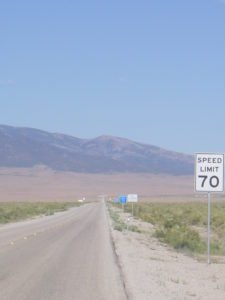 Which tells me something. The depression and anxiety that I have encountered feels less like a disorder and more like a message from my soul that something is not right. Either I am feeling trapped by my circumstances, fearful of my future, or just don't have the right frame of mind to see and feel gratitude for the life that is presently before me. I don't want to dismiss in any way those who have fallen into the pit of despair and depression. I don't want to suggest that just thinking better thoughts is like drinking a magic potion. People who suggest that these "disorders" are just in the mind often multiply the feelings of despair for the person feeling them.But I also want to say that in every case when depression and anxiety has grabbed a hold of me the final answer has always been either a change in my circumstances, a change in my plan, or a shift in my thinking. The depression has never just gone away like a flu bug that has to run its course. The two times I have been on medication I was thankful for the momentary boost, but the lasting solution was always a shift in my life or my perspective. Recovery for me was never "getting over" my anxiety, but was moving through it.Which brings me back to Thomas Moore's quote, "For the soul, depression is an initiation, a rite of passage." I do think there is a place for the diagnosis of clinical depression and I do think that some people seem more genetically predisposed to anxiety and depression than others. But I also think we often treat depression and anxiety as a disorder when we should be treating it as a "shout out" from our soul. I wonder how often depression and anxiety are just signals that our soul is yearning for something that we can't quite put into words yet. Moore makes the case in his book that we in the West often look for cures when what we should be doing is offering more care--thus, the title of his book Care of the Soul.
Which tells me something. The depression and anxiety that I have encountered feels less like a disorder and more like a message from my soul that something is not right. Either I am feeling trapped by my circumstances, fearful of my future, or just don't have the right frame of mind to see and feel gratitude for the life that is presently before me. I don't want to dismiss in any way those who have fallen into the pit of despair and depression. I don't want to suggest that just thinking better thoughts is like drinking a magic potion. People who suggest that these "disorders" are just in the mind often multiply the feelings of despair for the person feeling them.But I also want to say that in every case when depression and anxiety has grabbed a hold of me the final answer has always been either a change in my circumstances, a change in my plan, or a shift in my thinking. The depression has never just gone away like a flu bug that has to run its course. The two times I have been on medication I was thankful for the momentary boost, but the lasting solution was always a shift in my life or my perspective. Recovery for me was never "getting over" my anxiety, but was moving through it.Which brings me back to Thomas Moore's quote, "For the soul, depression is an initiation, a rite of passage." I do think there is a place for the diagnosis of clinical depression and I do think that some people seem more genetically predisposed to anxiety and depression than others. But I also think we often treat depression and anxiety as a disorder when we should be treating it as a "shout out" from our soul. I wonder how often depression and anxiety are just signals that our soul is yearning for something that we can't quite put into words yet. Moore makes the case in his book that we in the West often look for cures when what we should be doing is offering more care--thus, the title of his book Care of the Soul.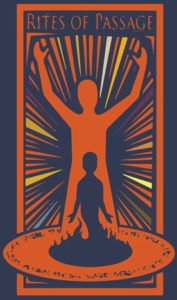 I resonate with his line that depression is like a rite of passage. Whether my depressions have been the two-year variety or the three-day variety I have discovered the same pattern--that is, that I seem to move through them like a baby in the birth canal. It's uncomfortable, it's cramped, it can be suffocating, and it's scary as hell. Yet every depression has resulted in an emergence into a new world--sometimes significant like a job change or a move and sometimes minute like a slight shift in perspective, giving myself a little more grace, or reminding myself to just calm the hell down.Depression and anxiety can be very scary. I know. They have been irregular visitors in my life for nearly thirty years. But I am learning to treat them more like friends being real with me than like viruses attacking my mental health. Either way it hurts. But the latter assumes that when we can cure ourselves of these emotional states we'll return to our former feel good state. The former assumes that we are just being unceremoniously goaded to a new place and a new perspective.None of this negates the need for a good therapist, psychologist and, sometimes, psychiatrist. Believe me, again. I know! But what it does is remind us that depression and anxiety may not be the enemy we often assume. They may be more like the brutally honest friend who invites us to take stock of our lives and make subtle or significant changes.I will not disagree with any therapist who challenges this based on their clinical experience. Nor will I try to convince any person who is currently experiencing depression and/or anxiety to see their disorder in a friendlier light. I will only say this--that every bout with these two characters has led me every time to either a change in my life circumstances or a change in my perspective. Pills have helped, but it wasn't the getting over that finally did it. It was the going through.Depression as a rite of passage? Moore might be on to something here.
I resonate with his line that depression is like a rite of passage. Whether my depressions have been the two-year variety or the three-day variety I have discovered the same pattern--that is, that I seem to move through them like a baby in the birth canal. It's uncomfortable, it's cramped, it can be suffocating, and it's scary as hell. Yet every depression has resulted in an emergence into a new world--sometimes significant like a job change or a move and sometimes minute like a slight shift in perspective, giving myself a little more grace, or reminding myself to just calm the hell down.Depression and anxiety can be very scary. I know. They have been irregular visitors in my life for nearly thirty years. But I am learning to treat them more like friends being real with me than like viruses attacking my mental health. Either way it hurts. But the latter assumes that when we can cure ourselves of these emotional states we'll return to our former feel good state. The former assumes that we are just being unceremoniously goaded to a new place and a new perspective.None of this negates the need for a good therapist, psychologist and, sometimes, psychiatrist. Believe me, again. I know! But what it does is remind us that depression and anxiety may not be the enemy we often assume. They may be more like the brutally honest friend who invites us to take stock of our lives and make subtle or significant changes.I will not disagree with any therapist who challenges this based on their clinical experience. Nor will I try to convince any person who is currently experiencing depression and/or anxiety to see their disorder in a friendlier light. I will only say this--that every bout with these two characters has led me every time to either a change in my life circumstances or a change in my perspective. Pills have helped, but it wasn't the getting over that finally did it. It was the going through.Depression as a rite of passage? Moore might be on to something here.
